#grand literary tradition!
Explore tagged Tumblr posts
Text
John Donne writing a poem: I dedicate this to the Father, Son, and Holy Ghost
adolescent sliding rapidly towards a kink realization: this speaks to my very soul
christian rock bands are a backbone genre in the amv scene
159K notes
·
View notes
Text
Venus In Houses In Groom Persona Chart
( For entertainment Purpose Only. Have Fun!❤️)


Venus, in a groom's persona chart, reflects his way of loving, romance, relationships, and aesthetic preferences. It reflects the ideal partner, how he shows love, and what he values in a partnership. Venus also signifies his social charm, creative talents, and how he seeks harmony and pleasure in life. Its house placement in the chart indicates the areas where he feels most fulfilled in love and beauty.
Venus in the 1st House:
The groom is charming, attractive, and naturally likable. He carries an aura of magnetism, often drawing people through his grace and personality. In relationships, he values mutual admiration and enjoys being adored. His physical appearance might be a significant focus, and he may strive to look his best. He is likely romantic and seeks a partner who complements his personality, enhancing his sense of self. His love language is all about affection and admiration. However, at times, he may rely too much on external validation, which the partner should balance by helping him build his self-confidence. This placement makes him a lover of life and beauty, someone who enjoys expressing love openly.
Venus in the 2nd House:
The groom relates love to security and material stability. He feels satisfied when he is able to provide for his partner and build a comfortable life together. The giving of gifts, luxury, and tangible expressions of love are at the forefront of how he displays affection. This placement indeed shows a great urge for stability in marriage regarding money matters, which often encourages careful planning for the future. He is seeking a partner who will value loyalty, share his love of comfort, and beautiful things. While this placement makes him a committed and trustworthy husband, there's an inclination to measure self-esteem in terms of material goods, which his life partner should balance by cultivating emotional closeness.
Venus in the 3rd House:
A man with this placement will be someone who craves mental compatibility in his romance. He would shower his beloved with love through words, judicious actions, and healthy, interactive communication. Communication is the key to his emotional fulfillment, and he feels contented when ideas and feelings are freely flowing in a relationship. He needs a partner to challenge his mind and to keep up with his playful banter. He may also be attracted to artistic or literary activities, finding hobbies like writing or storytelling appealing. Nevertheless, he may sometimes overanalyze some emotions or demand verbal assurances all the time, which his partner should have the patience to handle. This groom sees love as an adventure of the mind.


Venus in the 4th House:
This placement indicates a groom who deeply values family and emotional security in relationships. He seeks a partner with whom he can build a nurturing home and may prioritize family traditions and creating a warm domestic environment. He is deeply affectionate and protective of those he loves, often placing their happiness above his own. He considers marriage as the cornerstone in his life and source of emotional fulfillment. He may cling to the family's expectations or memories of the past with all his might, and that is what his partner should try to understand with empathy. The perfect relationship for him is based on emotional rapport and sharing dreams of a happy family life.
Venus in the 5th House:
Romantic and passionate, this groom thrives in relationships filled with excitement, creativity, and fun. He loves grand gestures of affection and enjoys the thrill of courtship. His love language might involve spontaneous dates, playful expressions of love, and creating memorable experiences with his partner. This placement often indicates a groom who seeks a soulmate-like connection that feels adventurous and fresh. However, he might struggle with commitment if the relationship becomes monotonous. His partner should encourage his creative outlets and participate in activities that they can share to keep the bond alive and kicking. This groom's love life often feels like a storybook romance.
Venus in the 6th House:
The groom shows love through acts of service and attention to detail. He is quite supportive and loves to contribute to his partner's well-being. He likes taking care of his spouse, either with practical help or small, thoughtful acts. He finds great pleasure in it, but of course, it would be nice if his partner could be more considerate and return his effort with gratitude. There is a tendency to be overly critical, particularly when his efforts go unnoticed. Marriage means togetherness and a sharing of responsibilities. He needs his partner to appreciate his need to be useful and appreciated in the relationship so that the scale is balanced.
Venus in the 7th House:
This is a very good placement of Venus because it reflects the groom being partnership- and marriage-oriented. He is naturally romantic and aims for harmony in a relationship. His ideal partner would be someone who possesses much grace, charm, and balance. He looks upon marriage as a partnership of two equals and hence tries to be fair and mutually respectful. This placement often shows someone who flourishes in long-term, committed relationships. However, he may tend to avoid conflict or suppress his needs for the sake of peace. His partner should encourage open communication and appreciate his commitment to harmony in the relationship.
Venus in the 8th House:
This placement represents a groom who desires profound and transformational intimacy with love. He is passionate, intense, and intends to share his innermost thoughts and feelings with his partner. He expresses his relationships through physical intimacy and emotional vulnerability. While loyal to the core, his strong emotions might give in to possessiveness or jealousy. His ideal match should reflect the depth of a man and guide this intensity into growth and understanding. Shared finances or business dealings could also be an essential part of his marriage. The groom believes in love that is transformative and transcendent.
Venus in the 9th House:
This groom is drawn to a partner who inspires his sense of adventure and curiosity about the world. He may meet his spouse through travel, education, or shared spiritual interests. He values relationships that broaden his horizons and often seeks out a partner who shares his love for exploration, learning, and cultural experiences. While this placement makes him optimistic and open-minded, he might at times battle with settling down or being grounded. His spouse should encourage his wanderlust while cultivating stability in the relationship. To him, marriage represents a path of growth and discovery together.


Venus in the 10th House:
The bridegroom's love is closely related to ambition and public image. He looks for a mate who furthers his professional ambitions or boosts his social status. This position does often define a bridegroom who is proud of his marriage and perceives his spouse as a complement to his success. He is faithful and committed but may be absent due to work at times. His ideal match should offset his ambition with warmth and emotion. To him, marriage is a personal pledge and a public partnership that defines his legacy.
Venus in the 11th House:
This groom values friendship and shared ideals in his relationships. He seeks a partner who shares his dreams, social goals, and love for community involvement. Love, to him, is about camaraderie and mutual respect. This placement often describes an individual who can be initially friends with his romantic partner and then gradually get into the relationship. Although he likes his independence in the relationship, his partner must not neglect the emotional intimacy in it. He does well in relationships where shared goals blend with emotional intimacy, and quite often works with his spouse on projects or causes that mean much to him.
Venus in the 12th House:
This placement can show a groom who loves on a deep, spiritual level and often unconsciously. He is empathetic and intuitive, possibly drawn to partners that have a mysterious or otherworldly aura. While deeply romantic, he may struggle to openly express his emotions or fear getting hurt. His ideal partner is someone who creates a safe space for emotional expression and shares his introspective nature. This placement often reveals a karmic marriage in which the connection can feel fated. He looks for an intense love, but he should beware of sacrificing himself or losing his identity within it.
--💚SS
#astrology#astro observations#astro notes#astro community#venus#venus in astrology#persona chart#groom persona chart#briede persona chart
621 notes
·
View notes
Note
hello. I read your bg3 marriage headcanons and was wondering if you could do a follow-up on what their first anniversary would be like? also add rolan, even though he wasn't in the original. only if you want to.
BG3 - 1st Anniversary Headcanons
[original ask in question X]
Gale
What does Gale ‘grand gestures are my love language’ Dekarios have planned for your first anniversary? Oh nothing special.
Just all your favorite meals cooked & ready for you. Starting with breakfast in bed. A small, light picnic at your favorite shoreline spot to watch the tides come in and enjoy the sea air. Ending with a romantic candlelight dinner that would put some of the finest Baldurian restaurants to shame.
He gives you a book of love poems as your present. Paper is traditional for the first anniversary after all. It is furthermore inscribed with his own, original poem on the front cover for you.
Astarion
He actually isn’t aware it’s your anniversary. Until he is reminded by someone. It’s not that it’s not important to him. Astarion has just never celebrated one before. How could he, when none of his previous lovers ever even stayed the whole night?
He has to work fast. But luckily Astarion is extremely clever and resourceful.
Playing it off like it was his plan all along to ‘pretend’ to forget, only for you to be further surprised is simply part of his plan. He plays it off so well that you believe him when he tells you that he got you a new necklace because ‘it reminded him of your eyes’. He makes a mental note to remember next year and be more genuine in his efforts.
A!Astarion
Of course, Astarion remembers the day you officially became his. Body, soul, and now legally.
Part of it may just be the celebration of having something that’s his. He hasn’t had anything for so long that he goes overboard. And with you, his most prized treasure, he can’t help it either.
The day, like all your days, is just about the two of you. He has a portrait commissioned for the two of you and commits to having one done every year, so you remember what you look like & how happy you are together. The old ones are kept in an archive below for safe keeping.
Wyll
He’s been looking forward to this day almost as much as getting married to you, the love of his life.
If he chose to stay in the Gate and become the new Grand Duke Ravengard, Wyll will host a ball so that you can celebrate with all those you hold dear. Old and new friends. He has the bard’s college compose a new song to commemorate the occasion, one that he can lead his partner out to the dance floor with and waltz them around all night.
If he went to Avernus to continue as the Blade, they will waltz together, alone, on the stoney rocks of the Hells. While Wyll hums a private tune between them to keep the music going.
Halsin
Halsin isn’t much for ceremonies or constructs of time. Nature and time move hand-in-hand with one another without making much note of their relationship, and he feels that they should do the same.
But…he can appreciate that something like this should be marked & remembered.
He will make time to get away from his duties as ‘Daddy Halsin’ to be a husband for a while; no matter how short it might be. He carves them a beautiful ornament. Something of a remembrance of their year to hang on a tree by their home. Halsin tells them that he hopes, one day, it will be filled with as many happy memories as leaves. The tree growing as with their love for years to come.
+Rolan
Who has time for such frivolities? Rolan has an acclaimed magic shop & literary archive to run, along with the magical commitments he has as the new caretaker of Ramazith's Tower. Surely, as his partner, they must understand that.
Lia gives him an extremely firm talking to about how selfish and narrow-minded he is being. That it’s not just about him anymore it’s about them.
Though Rolan will never admit that she’s right, he does make it up to his spouse. Apologizing to them for being so callous and making an effort to be more ‘traditionally romantic’. He presents them with a single white rose. Enchanted, so that it will never die, never wilt, and never fade. “It will always be as pure and radiant as my love for you. Should I forget to tell you every day, look upon it and remember. Though, I will try to remember to tell you everyday until my last ones.”
#baldur's gate#baldur's gate 3#bg3#bg3 x reader#baldur's gate 3 x reader#astarion x reader#astarion#astarion x tav#ascended astarion x reader#ascended astarion x tav#ascended astarion#gale x reader#gale x tav#gale dekarios#gale of waterdeep#wyll#bg3 wyll#wyll ravengard#wyll ravenguard x tav#wyll ravenguard x reader#halsin#halsin x tav#halsin x reader#bg3 rolan#rolan#headcanons#baldur's gate headcanons#bg3 headcanons#bg3 hc
587 notes
·
View notes
Text
I have so many thoughts I (ironically) can't put into words yet about the use of heightened and ritualized poetic language and phrases in connection to magic in Nevarra (or possibly within the mourn watch?). they don't default to an ancient language for it like tevinter predictably seem to, and while they do have a whole scholarly language for the academic side of it -- when they're actually casting it and interacting with the dead, they speak in common but through poetry and metaphor in ways we haven't seen any other culture do. maybe the avvar, as the closest, just in a different literary tradition. they speak to the dead, but in a living language. ingellvar rook gets a bit defensive and even reproachful during emmrich's recruitment quest when the other companion makes some sort of comment to question it. 'it's watcher tradition! >:('
'Open your hearts to the final day, companion of all the ages'. even a rook who doesn't take the almost religious element of the role of watcher as seriously knows that one by heart no matter what you make them say during walking the graves. when myrna in so many words says that the necropolis is still rook's home, the way they agree with her is simply to quote 'A home in life, a berth in death...' and her smoothly finishing the thought with 'a house of many mansions'. there are several times with emmrich where rook answers something he says just by quoting from some watcher text they both clearly know well. (if you do this to weasel out of answering when he asks if you're afraid of dying, he is understandably peeved you're quoting watcher 101 stuff at him, and rook clearly knows exactly what they're doing.) this shared base of literature -- and more than that a kind of oral tradition, it sounds like? it's just What You Say when you do certain things, do you think half of this is even written down anywhere? this shared inheritance of language making for a feeling of belonging and continuity is beautiful and moving in a way but also. a bit cold and distant, all mind and no body connection. which I feel might be a running theme around the necropolis haha they mainly seem to have interest in bodies once life has vacated them, they don't give that much thought to what makes it feel good to be in one while you're here. we can only imagine the psychological effects of growing up a crypt baby in this particular cultural milieu.
you know what it reminds me of a little bit in places, actually? the way the qun uses language and set phrases to convey layers of meaning. the qunari are an oddly poetic bunch. and I think there's also something here about like... cultures whose religious side are more about philosophy and the language used than an idea of the divine as such. yeah nevarra is technically andrastian, at least on the surface, probably largely for reasons of 'ugh it would be SO inconvenient to have an exalted march called on us :/ some of us have real shit to get on with you know this body isn't going to mummify itself. sure tell orlais we'll join their dumb club or whatever'. but within and beneath that the syncretism with and survival of much older traditions are still so obviously (and double ironically!) alive. how much does your average watcher believe in god, and how much and how immediately do they believe in the grand necropolis, and in their duty to what has been, what is and what will come after them -- the quest for knowledge? memento mori ass culture to the point of absent-mindedly forgetting about everything else including god (affectionate). maybe the maker exists, but he's just not that relevant down here. he may take the souls, but we still tend the graves. render unto the chantry what's the chantry's, and unto the watcher what is theirs!!! really is the whole thing huh
#dragon age#dragon age: the veilguard#dragon age: the veilguard spoilers#dragon age spoilers#the mourn watch#oc: Ellaryen Ingellvar#rook ingellvar#dragon age meta#A Watcher's work is never done#IT COMPELS AND FASCINATES ME! coming out of this game as if nothing else always and forever a nevarra stan#when you go up to the dead people room right before the final boss ingellvar rook tells the mourn watcher standing outside#'you have prepared a chamber of the dead? I thank you' with such genuine gratitude. do you think it weighs on them?#all the death they deal and the funerary rights that aren't performed afterwards?#even at the end of the world someone is fulfilling their oaths and that means everything to rook clearly#it feels like there's such a depth to this faction I can imagine rook down there being a part of it so well
133 notes
·
View notes
Text
The Romanticism of One Piece II: Fairy Tales
Part I Part III AO3
“I long to see the blue flower” --Novalis
In 1812, brothers Wihelm and Jacob Grimm published their first volume of fairy tales. The book was not initially meant to be read as purely children’s stories, but as a collection of tales they felt reflected German culture. They weren’t alone in their study of folk culture and stories, as interest revived throughout the Romantic period, particularly in Germany.
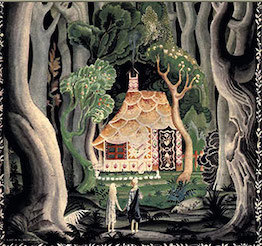
Later editions of the Grimm’s fairy tales, however, were changed to be more suitable for younger audiences. There was something about the stories that captured the mind of a child, and the expansion of children as their own demographic to be catered to encouraged publishers to specifically produce works for younger audiences. I feel like CS Lewis said it best while defending his own use of fairy tales, “He [the person reading fairy tales] does not despise real woods because he has read of enchanted woods: the reading makes all real woods a little enchanted”. The Romantics of this era were themselves enchanted by the power of these stories, and utilized them to great effect in their works.
Romanticism gets its name from the medieval ballads that were popular during the time period, themselves written in the romantic languages. Artists drew heavily from a mythologized past for their paintings, and writers such as Goethe and Novalis wrote literary fairy tales of their own inventions, drawing upon allegory and metaphor to express their philosophical ideals. In 1813 Percy Bysshe Shelly wrote a revolutionary and radical tract in the form of a poem and fairy tale, named after and heavily featuring Queen Mab. These men, along with the Brothers Grimm followed a tradition set by the “discovery” of Ossian, an epic poem that presented itself as the Gaelic equivalent of the Iliad or Odyssey, but was largely an invention of the poet James Macpherson.
One Piece is chalk-full of allusions to fairytale and myth. The manga opens with the grand execution of Gold Roger, his final words the sort of promise that you could easily see becoming a campfire story today, a whispered rumor and legend of impossible treasure for any person brave enough to go looking for it.
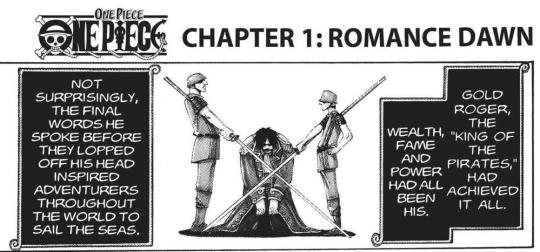
Oda starts leaning into real-world myth as early as chapter 23 with Usopp’s introduction, his name in part derived from the Greek storyteller Aesop and the plot a loose retelling of the Boy Who Cried Wolf, with his trademark nose being a clear reference to Pinocchio.
When looking at One Piece’s use of real-world myth and story, the thing that strikes me is how often Oda will borrow from the iconography of a story without simply rehashing it. Just about every major arc borrows in some way from real world children’s tales, but you’d be hard pressed to call Oda’s usage derivative. Even with the broad pool of references Oda draws from, the manga never would have lasted as long as it has if he’d just copied from the stories we’ve all heard since childhood.
For example, on Drum Island Chopper is a clear reference to Rudolph the Red Nosed Reindeer. Much like the Syrup Village before it, it draws directly on the themes of the original work, ostracization and rejection being primary motivators when developing Chopper’s arc.
But more than that, Hiliruk is introduced entering his unwitting patient’s houses through the chimney, just like Santa Claus, and Chopper’s repeated journeys up and down the mountain using the island’s rope system while pulling a sleigh is clearly borrowing from the iconography of Christmas. But you’d be hard-pressed to find anyone who would call Drum Island a Christmas story, even though it’s set on an appropriately wintery environment.
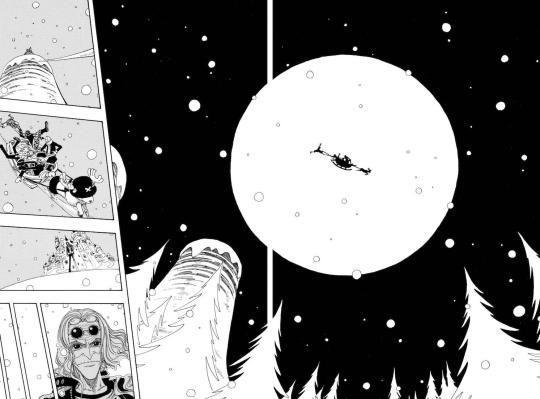
There are more examples. Laboon eating the Straw Hat’s ship could be seen as a reference to Moby Dick, Pinocchio, or the biblical story of Jonah, yet Reverse Mountain doesn’t share themes with any of those stories outside of the use of a mythical whale. The Skypiea Saga kicks off with the introduction of shadowy “giants”, before moving to a treasure hunt while befriending a young girl who plays a harp, and ends with the felling of a giant beanstalk. But does anyone really think of Skypiea as a retelling of Jack and the Giant Beanstalk?
My favorite of these has to be Alabasta, since I see so few people pick up on it. The entire climax of the arc involves a devilish crocodile, a man with a hook for a hand, a ticking clock, and the imposing presence of a giant clock tower that looks suspiciously like Big Ben in a setting otherwise influenced by Egyptian archeology. Why or how Oda decided to mix Peter Pan with his epic tale of friendship and betrayal amidst a war on a desert island is beyond me, but he did.
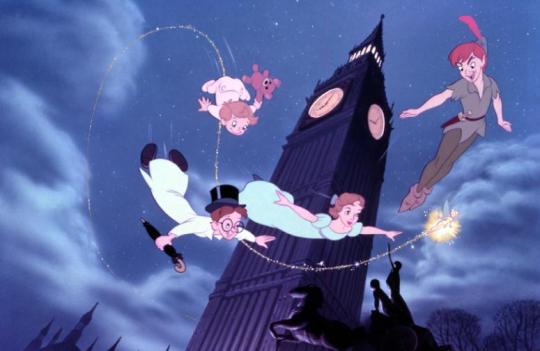
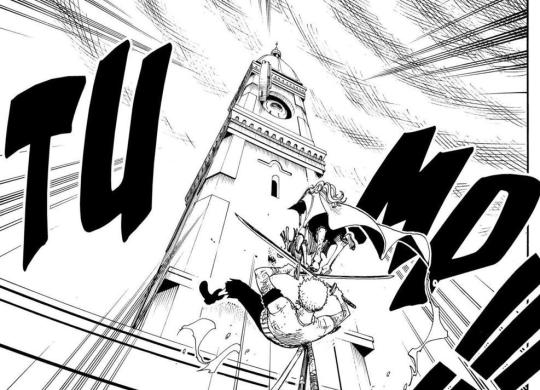
These examples aren’t only found pre-timeskip. I saw people able to guess who would live and die during Wano based solely on how closely Oda was following various Japanese fables, with broad plot elements being based on the famous story of Momotaro.
Of course, Oda doesn’t limit himself to fairy tale and myth. He frequently draws from history and pop culture at large, or, at least, the pop culture of his youth. Sanji’s design is based on Reservoir Dogs. All the Admirals share a face with Japanese actors. Thriller Bark is named after and directly homages—more than once!--Michael Jackson. Somehow you can have music video references sitting next to yokai, Frankenstein, the Invisible Man, and the Island of Dr. Moreau without cognitive dissonance, because that’s just how Oda writes. The Tree of Knowledge (the ‘of good and evil’ is implied) can coexist with Adam and Eve—which here are also trees—which can in turn overlap with Yggdrasil. The biblical ark Noah can exist in the same island as the Flying Dutchman, while the most biblically-coded of all the sagas can have an ark of its own while drawing many of its names and iconography from Eastern religions such as Shinto and Buddhism. That’s not when it’s drawing on Meso- and Native American iconography and religion instead. And somehow…somehow…it all gels together with the stories of El Dorado and Jack and the Giant Beanstalk.
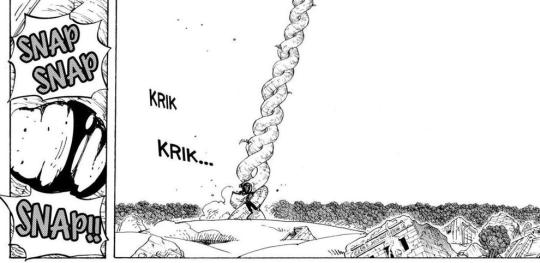
Once one starts going down the rabbit hole of references and homage it becomes hard to stop. The interweaving of so many references, both obvious and not, while still maintaining an original plot boggles the mind. How Oda got the idea to mix Alice and Wonderland, Power Rangers, Aladdin, and fascist iconography while also turning Sanji into a Disney Princess is beyond me, and in my opinion, a large part of his creative genius.
But the question remains…why? Why reference Santa Claus on Drum, or Jack and the Giant Beanstalk in Skypiea? Some allusions make sense with the surrounding story, but others seem to be placed at random just because Oda could.
I think the answer falls back to the Romanticism of One Piece. Oda has said in many different interviews that he writes with an audience of children in mind, particularly young boys. By pulling from the stories of childhood he creates a frame of reference, and because Oda draws from a wide pool of sources that frame of reference can have a more universal appeal, fitting with his world-spanning, swashbuckling adventure. I was never told the story of Momotaro, but I know about the Boy who Cried Wolf. My grasp of Norse mythology is shaky at best, but I recognize the image of a reindeer pulling a sleigh through the night sky.
As I’ll get into later, the Romantics were obsessed with the innocence and experience of childhood. That was one of the reasons they were drawn so much to fairy tales. To them, stories that were spread amongst the common folk were the most pure form of culture, and it was from these stories that they strove to create a shared identity.
One Piece is a world-spanning tale, and the stories it references reflect that. But for as different as culture can be from country to country, or island to island, there’s a shared humanity in the stories we tell. A fairy tale will always feel like a fairy tale, whether it’s from Japan or Germany. And by immersing itself in these memories of childhood, Oda carves himself a place amongst these ancient stories
Marking the end of One Piece’s prologue, chapter 100 draws back from the immediate story to call attention to its own internal myth. Utilizing some Oda boxes quoting Gold Roger, the narrator writes, “These things cannot be stopped. An inherited strength of will, one’s dreams, and the ebb and flow of ages. As long as people hunger for freedom, these things will always exist”.
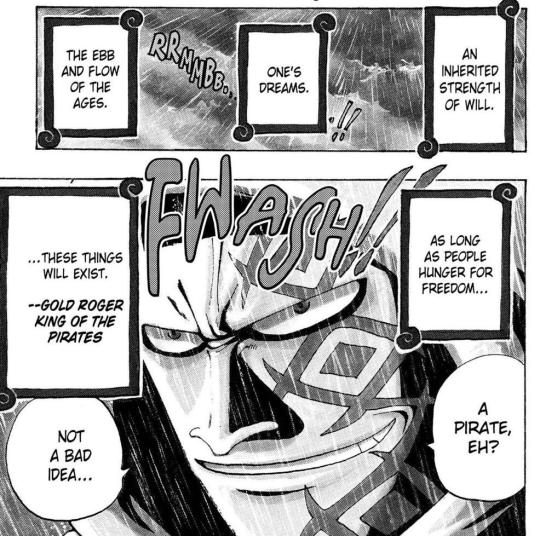
The name of chapter 100? The Legend Begins.
This isn't a coincidence. The Grand Line in particular is described in-universe as a land of fairy tales. The Little Garden and Elbaf arcs start with quotes from the explorer Louis Arnot. The cover of Brag Men, where these quotes come from, labels the book romantic fiction. Oda revealed in the SBS for volume 42 that the stories within the book are so outrageous and unbelievable to ordinary people that they’re believed to be untrue, much like the story of Noland the Liar.
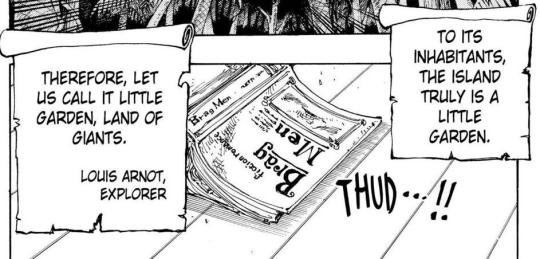
And yet, these are the stories that Luffy goes chasing after.
Now, I could send an age quibbling over the difference between a myth, a legend, and a fairy tale, but in the case of One Piece there’s enough overlap to be irrelevant. One Piece draws upon fairy tales because in many ways it is a fairy tale. It’s easy to imagine the entire story being told from Usopp’s perspective as he sits around the fire, telling his tale to a wide-eyed audience of children. Whether he’s telling the truth or not doesn’t matter, because it feels true, and for the first time the woods start to feel enchanted. And perhaps it’s that spark of magic that’s enough to stir the imagination of the next generation of dreamers to go out on adventures of their own, no matter how absurd and impossible.
129 notes
·
View notes
Text
APPRENTICESHIP

Preview: Set back in the olden days of China, your attendance was much summoned by Master Li Shen, a renowned Medical Physician that is in need of an apprentice. Known for his stoic personality, your temperance was definitely tested. But, could there be an actual explanation behind his stoicity?
Warnings: This is gonna be quite of a long read for you Zayne girlies out there so pls strap in. Fluff, makes your heart giddy in a funny way. A possible new series.
P.S: I am not a doctor, hence most of the 'medication methods' mentioned in here are for the sake of the plot and is not and shall not be implied to real life practice! Futhermore, I am not a historian so I am not the best at depicting traditional China perfectly, all of the basis of my descriptions are taken off of the Chinese dramas I used to binge on. This story was also highly inspired by this amazing artwork and the most recent memory of his! He is always known as Doctor Zayne in modern days, so why not give it an inspirational twist and make him a highly honoured doctor in the older days of Chinese history! Divider is sourced from here!
READ PART 2 HERE!

"We had arrived, Miss y/n." Waking up to the jolting of the chariot and the shoutings of the driver. Her head was ringing, possibly a light comatose from the constant bumpiness of the muddy roads for the past fortnight. Rests were only necessary for food and bathroom breaks but other than that, most of the time was spent encaged within the four walls of her chariot. Occasionally, the books may be entertaining; a romance novel, a literary piece and a biography of the great physician named Li Shen. The man named in the biography shall be her soon-to-be-teacher.
Master Li Shen is in need of an acolyte and y/n was called upon to meet him due to her father's connections. The old man boasted her to be a capable physicist, mildly implying his greed to receive a reputable name for his own bloodline. Although y/n father's opinion was distasteful, but she had decided to go through with it. Anything would grant her a better life than to be at home, waiting to be married off to some man who might be thrice her age and a pervert. Marriage is not the one thought she would want at this moment, let alone a marriage that she holds no control over.
Stepping out of her chaise, covered feet coming in contact with rocky pathways and eyes welcomed the sight of the abundance of verdurous greenery. Everywhere she looked, it was aligned with bamboos and wild grasses and ferns, standing on-guard and surrounding a standalone courtyard house. The courtyard house was mostly white and brown, the body of the walls being white whilst stilts were clearly constructed from lumbars. It sat within the same aesthetic framework as its surroundings.
The driver got off of his seat at the front of the chariot and he retrieved y/n's bags from under the chariot. “The master shall await for you in the house. I will get your bags into your chambers later. It is best to bid your greetings to the master as of now.” She heeded his instructions, walking over towards the grand doors of the standing structure. Pushing upon the heavy doors, it revealed a wall with a carved symbol—a standardised design of houses back in the days. The symbol is intricately carved by hand, taking shape of a leaf cradled by a pair of hands. It is a symbol that could only be bear by the best of physicians, an indicator of intermediate medicinal herb practitioners.
To the left, the hallways extended into a total of three rooms. All of the windows aligned with paper maché as windows and doors made out of varnished bamboo wood. On the right, only a set of sliding doors were found, no paper maché to be found on the windowsills and you assumed that is where the treatment room is allocated at. The courtyard in the middle held a small pool of lotus flowers, blooming elegantly on non-rippling waters. A stone table placed next to the pond, with incense burning on a wooden bark. It explains the lingering of a smoky-jasmine scent in the air.
“Y/n right?” A young man revealed himself from behind one of the sliding doors, adorning a cotton Hanfu. His features are sharp, pinched cheeks a good mixture with his chiselled jawlines. But his body was taut, the clothes he wore hung onto his mannequin-like body structure. “I hope the ride here has not taken too much of a toll of you as I could not afford to care for you the next day.” He was just as what was described in his biography. A man that owns an ego higher than his height, with a handsome face but too cold to touch. “Your chambers are located at the end of this hallway. Be awake at dawn tomorrow.”
Y/n laid in her bed at night, listening to the choirs of nocturnal bugs outside of her window sills, the haunting howls of wolves, the ricocheting chirps of the grasshoppers, the piercing screams of the cicadas. The room she was assigned to was fairly large, with more than enough space to fit a double bed and a dining table in it. The room is not anywhere special, it looked oddly familiar to her own room at home but minus the amount of gilt paintings and ornaments. It also reeked of herbs and incense that leaves a smoky aftertaste through one's nostrils. After a short staring contest with the ceiling, her dreamland beckoned and she willingly submitted to it.

The next day, y/n got jolted awake to screams followed by gibberish that was indistinguishable. Sitting up in a hastened manner, eyes widened and hair messily sat on top of her head. Oh no, the sun is up. She pushed herself off of her bed and scrambled to make herself presentable then proceed to storm off to the treatment room where she was expected to be. Sliding open the bamboo door, and she was welcomed with the sight of a young man wincing in pain, with the master holding a thread in his hands.
"Your habit of waking up to the sun heating up your bottom is unfavourable." Master Li Shen spoke, not sparing her any eye contact as he continued his suturing on the guy's back, and her peripheral vision eyed the man biting down onto a wooden bark to muffle his screams. "Don't just stand there, make yourself useful. Get me the herb in the mortar." And she did as she was told.
A huge gash streaked on the back of the young commoner, now sutured up neatly in measured knots. It seemed like it could have been caused by a blunt force of trauma. "Here." Y/n handed the filled mortar to Master Li and he applied it onto the wounds, the patient of his hissing in response. "How did he obtained this wound?"
"Whiplash, he said it was an accident, but judging by the wet patch at the front of his pants, I assume it's intentional for the whipping, just not expected for this aftermath." Hearing that, her face heated up at the context that she was provided with. Men of lower classes clearly have lesser safety measures when it comes to fulfillment of their kinks. "Serve him a cup of tea that would suit his current conditions. He has sutures and a mild fever from the infection." Then the physician got up, his outfit emitted his elegance, long and flowy, just like his hair; a symbol of virility in this age.
Once Master Li had left the room, y/n scooted over to the tea table, looking at the array of loose tea leaves at her disposal. She took up the small tea pot, and filled it up with the chosen tea leaves before brewing it for the patient. Amidst waiting, she decided to observe the lotus flowers in the courtyard. She slid open the door and there is Master Li, sat at the stone table, with a calligraphy brush in his hand and a scroll laid out in front of him. "Master Li." Y/n mustered up the courage to approach him. "I apologise for my tardiness this morning. I did not mean to be late."
He looked up, hazy green eyes glanced at her. His hand still hovering over the scroll. "Being tardy is not professional, it is not tolerable for me. Do not repeat that mistake, do you understand y/n?" She nodded quickly and sat yourself opposite him, watching him quietly as he started producing strokes of words on the scroll. His handwriting is surprisingly neat, and fulfills the box-like characters for Chinese writing. So he is not only a good physician, but also has good handwriting. When he is done, he set the brush aside and looked up at her again, expressionless. "I will be setting into town tonight to gather some herbs. Would you like to come with?"
"Yes, I would love to. I have not been here before." She smiled at him and the man in front of her sighed contently. Getting up to retrieve his scroll and he walked towards the room the patient is in. "The tea should be brewed by now, you should serve it while its hot. After you're done with this patient, you may rest and I shall see you later during dusk."
Two hours was spent on treating the oncoming patients and Master Li Shen had asked her to tend to them as he had some other matters to care about. The patients ranged from having a mild cold to obtaining wounds from their harsh work. The only weird case of the day was surprisingly the one that she woke up to early in the morning. Throughout the treatment process she got to hear what the patients have to say, particularly this old lady with the surname Hwang. "He is a lovely young man you know? He never charges us a single penny and always prepares chrysanthemum tea for me to bring home. Even on the days I am not sick, I could come over just to have a cup of tea with him and talk."
"I see." Y/n replied with her back turned towards the lady as she was preparing the medicated powders for the lady to bring home to her granddaughter. "Does Master Li Shen talk a lot?"
"He does, but not as much as he does for listening." The old lady chuckled, her sign of age disappearing for a moment whenever she smiles. "I was telling him the other day that my granddaughter is almost at the age of maturity. I figured I could introduce them together. It would be nice to get her to marry a physician, especially one who is so good looking and kind like him."
The load of information caught y/n off guard slightly, not being able to properly process it as she did not know him well enough to be a judge of character just yet. She instead, focused on the task at hand, wrapping up the earthly toned powder in a thin piece of brown paper and wrapped it with some thin bamboo strips and turning to face the woman, placing the packed medicine onto the table and sliding it over to her. "I guess marrying your granddaughter to a physician may not be a bad idea afterall." Slender fingers tapped onto the medicine pack. "Mix this with hot water and drink it twice a day. If she does not show any signs of improvement, you may bring her back next week."
After the dismissal of the old lady, y/n walked her out towards the main entrance. Upon arriving at the main entrance, the heavy wooden doors were pushed open and her hands unconsciously held the lady's shoulders, backing her up so she would not get hit by the doors given her poor vision. "Master Li Shen." Y/n greeted the towering man that slotted into the entrance and his eyes glanced over towards y/n, and towards the old lady.
"Y/n, Madam Hwang." A curt nod was accompanied with his greeting and he turned towards the young acolyte of his again. "You may get ready, I can lead Madam Hwang back from here." He extended an arm forward for the old lady to grasp onto.
Y/n was slightly reluctant of course. He had only came back and now he has to leave the premise again just to walk the old lady home. She did wished for him to take a rest before the outing with him later in the late evening. "But Master Li Shen, you had only came back from your trip to--"
"I will be fine y/n." The end of his lips pulled up slightly, revealing a small smile of solace. For a man whom had always been content with their own loneliness, having someone who cares for such a minute detail made him felt acquainted. "I shall send Madam Hwang home and await for you in the courtyard for our outing in a bit. Come Madam Hwang, let's get you home." His tone, amiable towards the senior as he slowly walked her out of the premises. It was at this moment that got the young maiden wondering if Master Li Shen had always been such a warm fellow and he is the total opposite of what the rumours had suggested of his attitude.

The town was much bigger than what she had expected, streets lined with stalls selling various goods, foods and beverages. Lanterns lit up the street in a warm glow, a stark contrast towards the silverish-blue rays of the bright moon for the night. People of all ages flood the street like ants within a colony, busy yet lively. Y/n walked next to Master Li Shen, cautious in herr steps as she does not wish to bump into anyone and cause any trouble.
A kid was shouting something incoherent, the thick accent of his made the dialect sounded like a foreign language. "Watch out." A palm landed onto her shoulders and she was forcefully tugged aside, her other shoulder bumping into something solid and she winced at the interaction. Looking over, y/n noticed Master Li Shen was the one who has his arm around her, a glare sent towards that mischievous kid who charged right towards you earlier. But when he looks down towards the young maiden again, his glare dissipated. "Are you alright?"
"Yes, Master Li Shen, thank you for watching out for me." You bowed slightly, a common courtesy in the olden days to show one's respect to another. His arm around her shoulder dropped and she could feel the heat prickling on her cheeks. Never once, she was touched by a man other than her father. Although the touch does not mean much, it still lingered on her skin.
"You should walk in front of me," she raised an eyebrow at his suggestion. "So you may be safer in this crowd." Nodding her head, she position yourself in front of him and slowly lead him through the crowd, cheeks still burning whenever his chest would accidentally bump into hers due to the crowd flow. The man behind her however, had no issue following behind her, his vision clear given his height difference from the norm. Or so he thought. "You may turn right on the upcoming junction. That should lead us right to the--- y/n?" Looking down, y/n's figure is nowhere to be seen. "Y/n?"
The crowd was too hectic, she had underestimated the crowd flow as she weaved through individuals, totally forgetting the fact she was supposedly accompanied by a giant. Given her small stature, she managed to get past the crowds easily only to find herself lost in a small alley. The darkness loomed over the alley, swallowing everything within its path to blend it within the shadows. Y/n could make out movement from within the shrouded darkness, but it sent goosebumps down her spine. Something does not feel right.
Suddenly, a bony hand reached out from the dark and she cried out as it grabbed onto her arm. The force then started to reel her in, and she could feel her tears surfacing to her eyes, too stunned to fight back. "Let me go!" She shouted in a desperate attempt to flee, head turning towards the crowd to grab someone's attention with her voice. More hands had started to extend from the dark alley to secure her legs and the ends of her dress, ready to drag her into god-knows-what. "HELP---" Another hand slapped itself over her mouth and she was immediately voided of her attempts to free herself as she got dragged into the darkness.
How long has it been? Her eyelids lifted every once in a while, visions went from black to blurred in a few blinks. She was drifting in and out of a state of unconsciousness and her ears could only take in the sounds of someone breathing hard. Her body was jerked back and forth, feet are certainly not on solid ground. But it felt like she was floating?
When y/n managed to snap her eyes open, she shot up while inhaling a breath so sharp it jabbed her lungs. "Careful, you might hurt yourself." The voice got her snapping her head towards the side, seeing Master Li Shen seated next to her, blowing onto the tea cup in his hand. "Here, have some of it. It shall quench your thirst." He handed her the cup that he had blew onto. Sipping onto it, the warm temperature soothes her body immediately.
"What happened?" Y/n asked, placing the tea cup back onto the table and looked at him. The moonlight gleamed through the wax papers of the window sills, an unnatural soft glow coming into the room and lighting his face up just enough to for her to read his expressions, which holds a blank slate. "You just got a little bit of a concussion. Nothing much to worry about." His voice was hushed, cool-headed as always. "You shouldn't have ran off like that, the town is dangerous. Especially for newcomers like you. You're fresh meat alike to them." He then leaned forward with a piece of cloth in his hand. She was too fixated on trying to regain her memories of the happening that she had totally missed out on him wringing out the cloth.
The way she had withdrew herself out of shock halted his movements from reaching his hand out further. He figured it would be best to get her permission before he proceeds. "You have some cuts on your cheek, I am going to clean it for you." So much for asking for her permission, it's more like he is demanding for her face to be served to his treatments. It does make one wonder if he treats all of his patients like this? Demanding.
To Li Shen however, it was more of an act of service. He could care less if someone was found in the state she was in earlier. Finding y/n in the alleyway, strewn on the muddy floor like a puppet as men stood over her, ready to do whatever they had planned to do. Alleys were never known to hold people of high morality and it got Li Shen irked on what he thought they might do to someone so beautiful like y/n. Yes, Li Shen does think of her as a beauty. Hence, he went out of his way to save her. He did managed to save her in one piece, but part of his guilt still troubled him, wishing that he could have stop them from digging their dirty nails onto her skin and causing those scratches and cuts.
"I can do it myself Master Li--" She was paused when he put the wet cloth over her mouth to shush them. He was so close that she could smell the scents of the market she was in earlier. Smells of the sweet tanghulus and freshly made baos, enveloping his usual jasmine-incense musk.
"Please, call me Li Shen from now on. We are quite close in age, there is no need for so much formality." His wet cloth pressed against the cut on the right side of her cheek and she winced in return, cheeks turning the opposite direction due to the stinging pain. "Stay still, it will only hurt a little." His free hand came up, and two fingers were placed under her chin as he turned her head back to face him. His gaze was steady, not on her wound, but staring right into her soul. Those emerald orbs that held a lot of emotions in them, yet she could never seem to read through them.
The tension grew between the both of them, as the staring contest went on. For a moment, she was encaptivated by him, a man so ethereal and smart and mysterious that it makes one want to fall for him. Maybe he is not the same as what the rumours had always suggested. "Li Shen." Her mouth blurted out his name before her brain could even process the emotions and she immediately looked away to hide her embarassment.
When she broke off the eye contact, it got Li Shen to snap out of his own reverie as well. His heart was thumping against his chest when he looked at her a while ago. It was as if the night had gotten longer. She looked ethereal to him too, the shine of the moonlight highlighting her facial features; her big eyes that had always held sincerity in them, soft and plump lips that makes the best smiles and laughters, her long brunette hair that flowed down to her waist, a heart so big that if given the chance to fit everyone in it, she would. She had never changed from the last time he had last seen her.
Li Shen had never really been associated with any females for any romantic relationships. Even when he was introduced to different potential marriage partners, he had never felt the need to be in a relationship. But with y/n, he just knew that it had always been her. Even from young.
"Yes?" It had never felt so right for him to hear her say his name out loud again. But, did she remembered him? Before her last accident? Right before he had left to the city for his physician test? When he had gotten news of her drowning because she fell into a well by accident and only to be awoken to a fresh start for memory collections. Had he ever once popped up in her pretty little head?
He anticipated for her response, trying so hard to not break the ice and to ask her the question he have had the moment he saw her within the candidate pile to be his assistant. However, his anticipation diffused as soon as she answered. "I...I didn't know why I did that. I apologise." Her apology was frowned upon for the wrong reasons, but Li Shen of course, was discreet about it. "I only remembered I blacked out."
"You don't have to know what happened." Li Shen tilted her head back to its initial position and wasted no time in pressing the cloth against her cheek. She hissed this time, biting her lip to stop herself from turning her cheek again and to disrupt his aid. "But you are safe now and that should matter the most." The statement came off to be more bitter than what he had intended to. It was a long awaited sentence. But with the current context of her not even having a slither of memory of him, it hurts him to say it. "The water was mixed with some herbs, it shall promote healing within a couple of days. You had a few cuts on your legs and arms too but I had helped you to apply some medication onto it while you were unconscious just now. I will see you tomorrow morning."
The physician then got up, his height immediately taking up space within her room. She may not know him, but she could tell that he seemed bothered. His sudden change of tone and body language got her curious. Without much thought, she leaned up slightly and grabbed ahold of the ends of his outfit. He stopped in his tracks and turned to look down at her. "I will not run off again next time, Li Shen. I'm sorry for what happened today. And thank you, for saving me." Accompanied with her smile, it only got Li Shen's heart weighing more than ever. The physician only gave her a nod of acknowledgement and sees himself out of her chambers. If only he had never left her from the start, then perhaps, he could have actually saved her.

OKAY BBYGURLS, this is soooooo long overdued because of a writer's block. Lemme know in the comments if this is worth for a part 2 hmmmm :)))
READ PART 2 HERE!
#love and deepspace#love and deepspace x reader#zayne love and deepspace#lnds#fluffy#zayne x reader#zayne sfw#zayne angst#zayne lnds#zayne fluff#l&ds zayne#dr zayne#li shen#love and deepspace zayne#lads zayne
241 notes
·
View notes
Text
The Romanticism of One Piece

I’m always amazed by how Oda has managed to stay thematically consistent for more than two decades while writing a thousand plus chapter epic about silly pirates having fun chasing their dreams. One Piece, at its core, is about the dawn of a romantic adventure, and its been that way since volume one, chapter one.
But romance is one of those terms whose meaning as shifted over the years and is drastically misunderstood. So what is literary romance, and how does One Piece fit within its framework?
Well buckle up, folks. This is gonna be a long one.
Romanticism as a movement started in the late 18th century, and is described by Isaiah Berlin as the “the greatest single shift in the consciousness of the West”. The modern ideas of childhood, imagination, and sentimentality were born here. It’s a rejection of society’s constraints in favor of impossible yearning for impossible goals. Romantics were restless and passionate, and embraced the magnitude of their feeling over the scientific rigors of the Age of Reason.
Sound familiar?
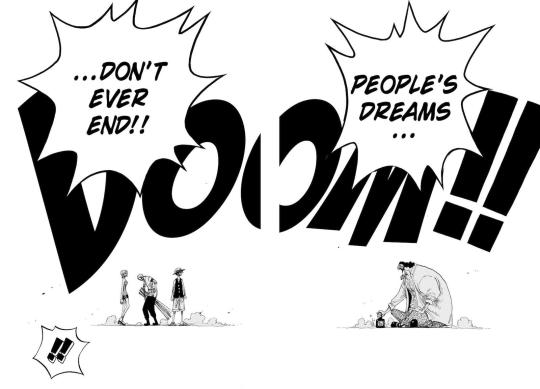
Romanticism gets its name from the old medieval ballads (themselves written in the Romantic languages) that became popular with the growing movement. The 19th century was a period of incredible change. Industrialization, urbanization, and the development of the middle class were all new. Revolution, both industrial and political, was changing the course of the world forever. The Romantics worshiped heroes of the past (in fact, the term hero worship was coined during this time) and sought a return to nature. William Wordsworth famously lobbied against the building of railways in his beloved Lake District, and much of the art of the time, whether it be painting or poetry, focused heavily on man’s relation with nature
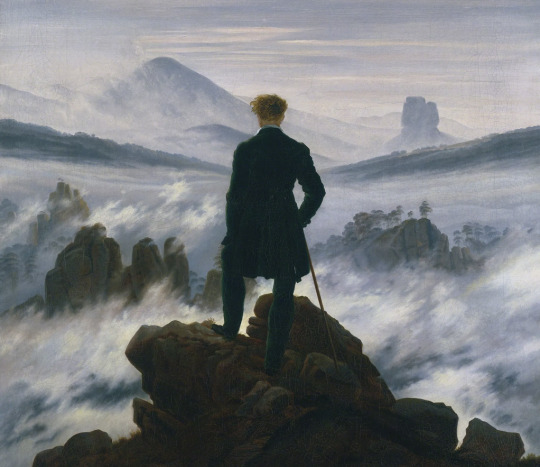
In addition to rebelling against traditional political structures, the Romantics also broke away from the traditional religious teaching, many believing that man found enlightenment not through theology or the bible, but by study and attunement with nature. One of proto-Romantic writer Jean-Jaques Rousseau’s most influential works Emile, or On Education was banned in parts of Europe and even publicly burned due to its ideas on natural religion.
All of this leads to the Romantic pursuit of the sublime. While Enlightenment thinkers would often attempt to remove themselves emotionally from what they were experiencing in order to understand said experience through objective, immutable fact, the Romantics sought emotion, awe, and reverence that transcended rational thought. They celebrated and marveled at the wonders of creation, allowing themselves to be consumed by emotion and experience. These were not stoic people, and its here where One Piece truly begins to shine as a work of Romantic art
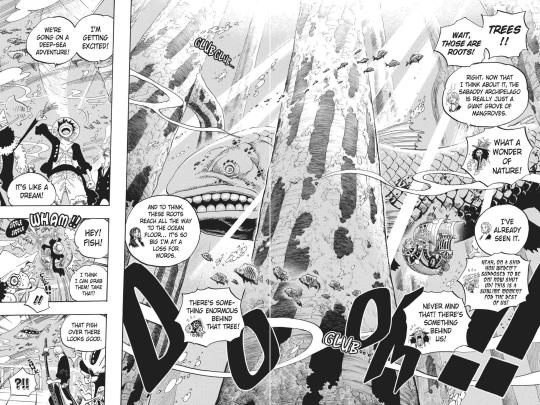
The world of One Piece, particularly once the story gets to the Grand Line, is chalk full of impossible wonder and whimsy. Each island visited along the journey is a feast for the eyes, and Oda’s art does each distinct and incredible location every justice. Luffy has no desire to see the boring or everyday, and he has no qualm in expressing his excitement everywhere he goes. Oda has made the conscious decision never to let the reader look into Luffy’s thoughts via thought bubbles, but the audience is still able to connect with him because they are always aware of what he he is feeling. Every smile takes up half his face, every sadness drawn as a sniveling wreck. Logical ideas are routinely rejected in favor of desired experiences, and Luffy himself rejects the opportunity to hear the answer to the series’s biggest questions because to him, the journey is more important.
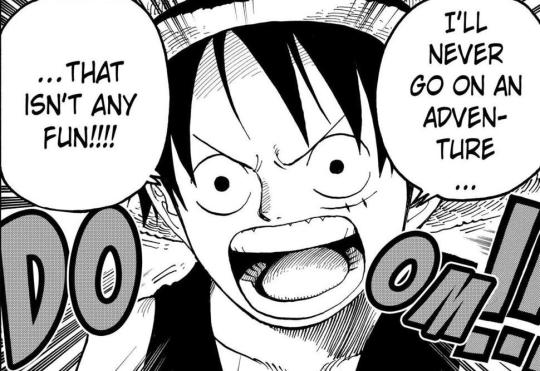
It’s important that Luffy’s mindset isn’t all that common, even a world as wild and wacky as One Piece. As the Jaya arc proves, Roger’s execution initially inspired a generation of pirates to go out and follow their dreams, but in the twenty years since his death that ideaolgy has crumbled under the weight of a new wave of dreamless pragmaticism, the same way the Romantic movement gave way to the Realists who followed.
Luffy’s Romantic spirit stands out, even amongst the Straw Hat Pirates. Many of the Straw Hat’s character arcs involve Luffy helping to remove the blocks that prevent them from living out their Romantic ideals. As the series progresses, the crew inches towards embodying that freedom of spirit that Luffy exemplifies. What that looks like for each crewmate is different (Romanticism is highly individualistic, after all) but they’re given the opportunity to live out that ideal because of their association with Luffy.
This theme of freedom of expression and pursuit of dreams follows the Straw Hats wherever they go on both the micro and macro level. The Romantic pursuit of self-determination bleeds over nearly every arc with Luffy at its epicenter, until it comes to a crescendo during the Wano arc, when the true nature of Luffy’s fruit comes to light for the first time.
Luffy is the beating heart of One Piece’s Romanticism. He specifically imbues many of the Romantic ideals of childhood, such as innocence, joy, and being unprejudiced by a corrupting society. He’s uncomplicated yet passionate, without a care in the world for what anyone else thinks about him, and because of that disregard for authority he comes off as equal parts wise and naive.
In Emile, Rousseau lays out his idea of childhood education, which doesn’t include a classroom so much as the child’s interaction with the world, emphasizing the senses and building on the child’s own observations and inferences. The Romantic child was instinctual and in tune with nature, and a character like Luffy growing up on the fringes of society while spending most of his time romping around in the woods would not be out of place (see Mary Robinson’s The Savage of Aveyron, based on the real story of a feral boy that had been found in France).
What makes Luffy different is that he never loses that simplicity of character even as he interacts with an increasingly complex world. Yes, he matures both as a person and a captain, bearing the weight of terrible loss and difficult decisions, but he does it still while maintaining that curious mix of selfish desire to do whatever he wants and selfless sacrifice towards the people he cares about. Luffy doesn’t want to be a hero, but remains uncorrupted by the malevolent social hierarchies that rule One Piece’s world.
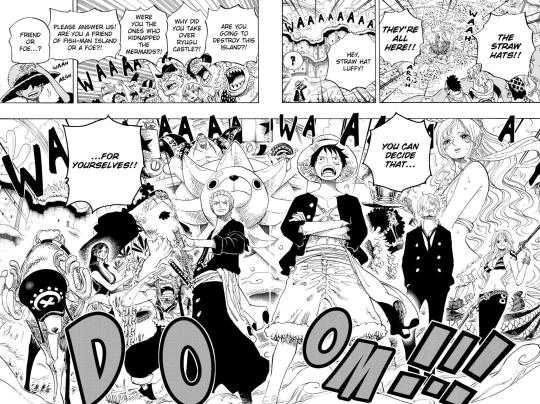
But for all the ways One Piece is a Romantic story, the philosophy of the series departs in several key places. The Romantics of the late 18th and 19th centuries were reacting to the anxieties brought around by the Industrial Revolution and the subsequent urbanization that came along with it, while One Piece belongs squarely to the post-modern era of the 21st. While both glorify a long-gone past, what that past looks like is very different. One Piece fully embraces technology and progress, as best seen during the conflict between Noland and Calgura in the Skypia flashback. While industrialization is sometimes portrayed negatively (see Wano) it’s just as likely to be seen in a positive light (Water 7), and the mysterious civilization of the Void Century was more technologically advanced than the present day manga, not less.
What’s more important than modernization and technological advance is the ways people use said technology. The beautifully rendered locations along the Straw Hat’s journey are just as likely to be vast stretches of wilderness as bustling metropolises, and that search of wonder and the sublime is equally likely to be found in both.
More importantly, I think, is that the Romantics of old were solitary creatures, brooding and isolated from the people around them. There was a preoccupation of creating art devoid of outside influence. The sublime was a deeply personal experience that by its very nature could not be shared with others. Melancholy, loss, solitude, and death were preoccupations of the Romantic mind, the price of visionary genius being social isolation.

One of the most famous Romantic heroes of the 19th century was Thomas Chatterton, a young genius of a poet who, in the midst of poverty and depression killed himself at the age of 17. He was immortalized in paintings and poems, and his influence can be felt to this day by the persistence of the trope of the suffering artist that he, and countless others, helped codify.
One Piece is the story of a boy who rejects the confines of society in search of his own freedom, but he does not do so alone. Luffy is driven as much by the desire to be with his friends as he is by his desire to find the One Piece. The series agrees that risking death is an acceptable part of chasing ones dream, but rejects the notion that it should be sought out or celebrated. It’s better to live an undignified life in the hope of a better tomorrow than to give into an easy death.
And that’s the fascinating part about how philosophies evolve over time, because as much as One Piece borrows from the Romantic era of the 18 and 19th centuries, it isn’t a Romantic story, just as how no amount of research and copying of style could ever turn a historical novel written today into a product of the era its trying to emulate. Oda has taken an old idea and made it into something new, using that idea as the guide for the entire series. Like sun, guiding to the dawn of a new era.
A Romance dawn, if you will.
942 notes
·
View notes
Text
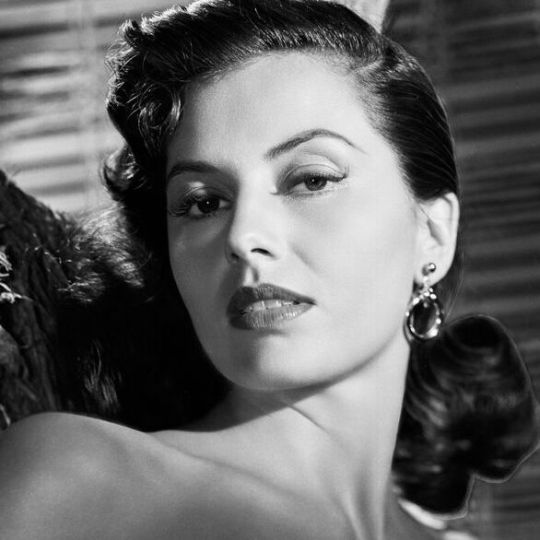
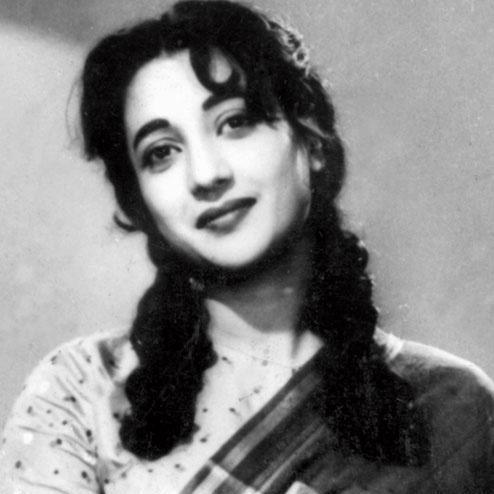
Propaganda
Cyd Charisse (The Bandwagon, Brigadoon, Singin’ in the Rain)—LEGS LEGS LEGS I would sell my soul for the legs of Cyd Charisse - she oozed style and glamour and sex appeal!! And she could DANCE! She was dancing next to the greats - Gene Kelly, Fred Astaire but they are never who you're looking at because why would you when you can look at her. I will only sit through too long ballet breaks for her. If there was any woman who you could call sex on legs it was her. These dances are everything to meeee (she comes in at the minute mark) and this dance too of course is iconic. In the words of Fred Astaire 'When you've danced with Cyd Charisse you stay danced with'
Suchitra Sen (Harano Sur, Chaowa Pawa)—Suchitra Sen! She had a 25-year career in Bengali films, and was at the height of popularity for a solid two decades as half of the wildly beloved pair of Uttam-Suchitra, who were practically the entire romantic genre of Bengali films by themselves. She acted in literary adaptations, romantic comedies, (melo)dramas and inspired-by-current-events films. She was the first Indian actress to receive an international award at the Moscow International Film Festival. In 1978, after the release of her last film (a box-office flop) she pulled a Garbo and put herself out of the public eye completely. She made no appearances, gave no interviews, refused awards, all of it. She didn't even show up for her daughter's or grand-daughters' debuts! She was taken for funerary rites in a covered hearse! The glamour! The mystery! That blinding smile!
This is round 2 of the tournament. All other polls in this bracket can be found here. Please reblog with further support of your beloved hot sexy vintage woman.
[additional propaganda submitted under the cut.]
Suchitra Sen:
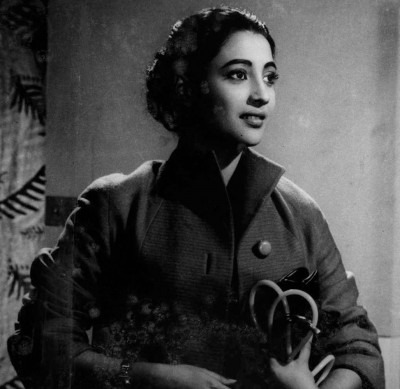
Not to take away from her costars in Devdas (1955), but the great Indian cinematic tradition of Tragic Romantic Yearning would not, I argue, be what it is without Suchitra Sen's performance in that film. I root for things to turn out better for her every time, even though I know how things are going to go.

A Bengali cinema icon. Liked crows (per Gulzar, "It was an astonishing sight. The crows used to pick at the grapes from her hand").
Linked gifset
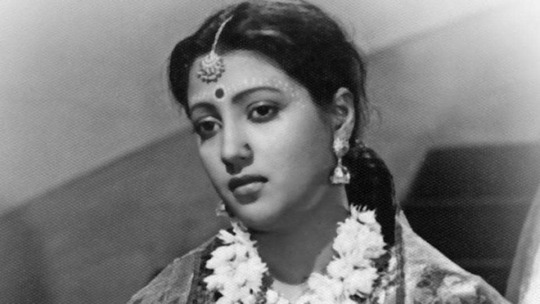
She once rejected Raj Kapoor's movie offer (one of the most successful actor and director at the time). She was quoted saying, “In men, I don’t look for beauty. I look for intelligence and sharp conversations. I had refused Raj Kapoor’s offer almost immediately. He came to my residence offering a lead role and, as I took my seat, he suddenly sat near my foot and offered me a bouquet of roses while offering the role. I rejected the offer. I did not like his personality. The way he behaved – sitting near my foot – did not befit a man.”
Legendary poet, lyricist, director and writer Gulzaar had this to say about her "Glad that my ‘Sir’—that’s what I call her— got the Dada Saheb Phalke award during her lifetime. Contrary to people’s perceptions, Suchitra Sen is an extremely warm and very very friendly person. I adore and respect her. But she has the right to choose her friends. Surely she’s justified in keeping away from every Tom, Dick and Harry. She’s the only example of such quiet dignity in show-biz. That’s why the media compares her with Great Garbo. Suchitra Sen is my Sir. I’ll explain. During the shooting of Aandhi she started calling me Sir. Everyone in Kolkata calls her Madame. Since I’m her junior I requested her not to call me Sir. But she insisted. (We always converse in Bengali). So I call her Sir and she calls me Sir.”
Linked musical number [won't let me display embedded for some reason]

Cyd:
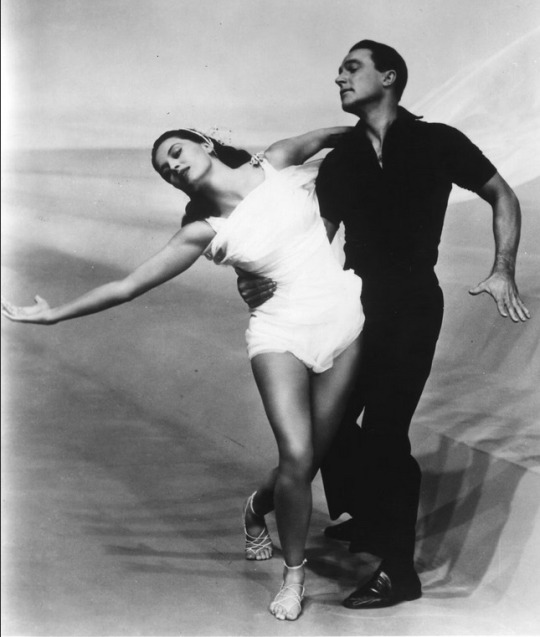
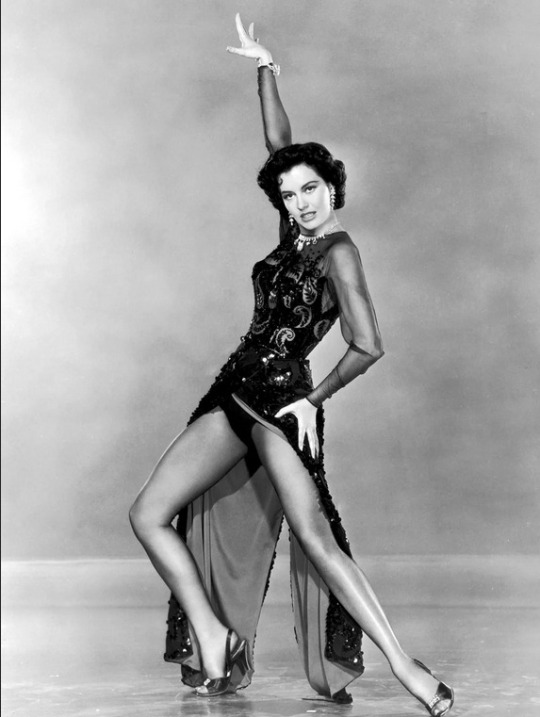
Photos do not do Cyd Charisse justice, unfortunately, because she is at her hottest while dancing, which she was exquisitely good at. Just go watch her first number in Singin' in the Rain, in that green dress; nothing I could say here will be more convincing that that.
She had amazing legs, and she knew how to use them! You probably know her best from the dream sequence in Singin' In The Rain. She was such a stunning dancer, and all her dance scenes are hard to look away from.
Dancing in the Dark clip:
youtube
She's an amazing dancer and my favorite from the period. Here's her and Fred Astaire in the Band Wagon:
youtube
I just like a woman who's there to be really incredibly good at dancing.
One of the most talented female dancers in Hollywood history, but what sets her apart from other competitors for that title is that she...umm...well let's be blunt, she was the dancer who put sex into it. The one who said "Hey, you know that A+ leg tone that naturally develops from doing this for a living? Why don't I let people see that? Like at every opportunity?" She reportedly insured her legs for five million dollars after hitting it big, which just goes to show that fame makes you crazy. It should have been ten million.

Arguably the Best female dancer of her time, she supposedly insured her legs for $5 million dollars. Stole the show whenever she had a dance number, even if she went uncredited. Musicals started to go out of fashion so unfortunately she didn't have as many big roles as she should have, but those she did are unforgettable. The Broadway Melody number in Singin' in the Rain - the green dress!
She could pirouette in pointes or tear it up in taps. Fred Astaire called her "beautiful dynamite" and wrote, "That Cyd! When you've danced with her you stay danced with." Gene Kelly partnered with her three times. Her legs were (reportedly) insured for $5 million in 1952 ($57.8 million in 2024 dollars)! Everyone in this poll will be iconic, but for raw physical grace, Cyd is up there with the best.
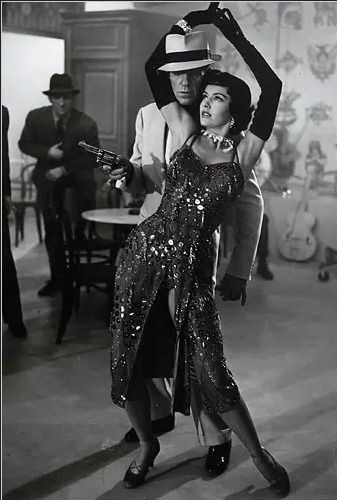
Legs for days, beautiful dancer in the most iconic scenes of Singin in the Rain. She's glorious. As some guys sung to her in It's Always fair weather, 'baby you knock me out!'
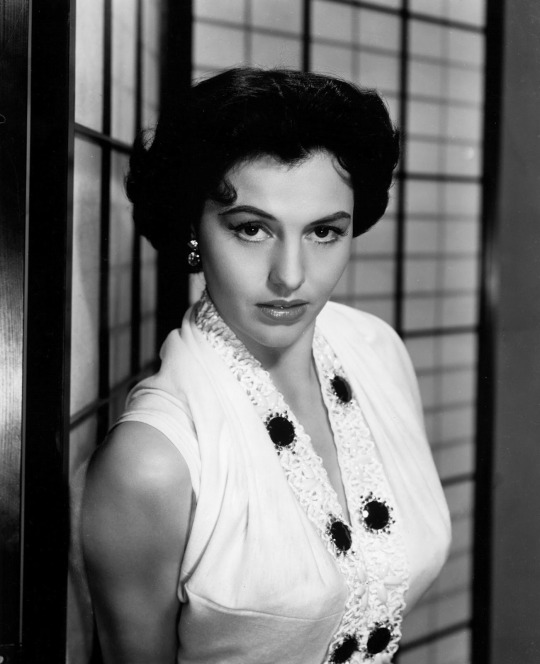
Incredibly, Cyd Charisse only started learning to dance as a rehab exercise to strengthen her body after a childhood bout of polio. She was in high demand as a dance partner, Fred Astaire called her beautiful dynamite and said "When you've danced with her, you stayed danced with". She was one of a few leading ladies to dance with both Astaire and Kelly, declaring them both delicious. Kelly apparently was stronger, while Astaire was more coordinated. She also said her husband would always know who she had been dancing with because Kelly left her bruised, while Astaire didn't leave a mark. She's better known for her dance numbers today, but she was a leading lady in her time! Her Scottish accent in Brigadoon leaves a lot to be desired, but compared to the other actors in the movie, it's almost good. She appeared in The Harvey Girls alongside Judy Garland and Angela Lansbury in her first speaking role, but she really burst onto the scene with Singin' in the Rain and her infamous Broadway Melody Ballet number with Gene Kelly (no one could handle a length of fabric like Cyd Charisse). She was brought in because Debbie Reynolds wasn't really a dancer and Kelly was notoriously a stickler about his Vision. After that she starred opposite Astaire in The Band Wagon, which was a bit of a flop but created some enduringly incredible dance numbers. She went on to star in a number of MGM movies, and was one of the last of the Studio era stars to remain on contract. Since we've got up to 1970, I'm including her opening routine in The Silencers (1966) to show just how long she was making a splash - she's into her 40s here and still a siren:
youtube
and of course, the iconic Broadway Melody Ballet -
youtube
157 notes
·
View notes
Text
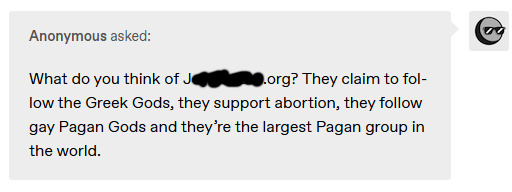
LOL, you shitheads again? You must really love getting your asses kicked if you're coming to me, of all people.
For anybody unaware, the Satanists behind the website mentioned in this ask are a bunch of openly antisemitic conspiracy theorists appropriating Eastern traditions, and they've been trying to advertise themselves and increase their SEO by sending asks like these. Each ask is tailored to appeal to whatever they think your beliefs might be, but they all follow a similar template that goes something like:
What do you think of [URL redacted]? They claim to follow [insert gods here], they [something about supporting abortion], and they're the largest [insert group here] group in the world."
The spirituality promoted on this website is rooted in deeply antisemitic conspiracy theories and pseudohistory. If I addressed every single claim they made, I'd be here all day, so I'm going to stick to a few examples:
They claim that Satanism isn't a reaction to Christianity, but is in fact older than Christianity. This is straight-up pseudohistorical bullshit.
They claim that Jews have perpetrated a grand conspiracy to conceal true spiritual knowledge from the masses. They outright cite The Protocols of the Learned Elders of Zion, a Czarist hoax created to justify violence against Russian Jews in the late 19th century. They claim that Christianity is a Jewish tool of world domination and mind control.
They claim that "Jewish ritual murder" is a thing. This is blood libel, an old conspiracy theory used to demonize Jews.
They claim that Jesus was a fictional creation made out of tropes "stolen" from various pagan gods. There is no actual evidence for this; it's another conspiracy theory. For a scholarly look at what most probably happened, I recommend How Jesus Became God: The Exaltation of a Jewish Preacher from Galilee by Bart D. Erhman. Or if you can't get your hands on the books, just look into Dr. Ehrman's videos/lectures on the topic on YouTube.
They push the extremely racist ancient aliens bullshit, claiming that the pagan gods were actually aliens.
They claim that the serpent actually represents human DNA, life force, and kundalini. This is a conspiracy theory that disregards the diversity of lore about serpents in various belief systems and traditions around the world, and culturally appropriates from Eastern traditions.
Their idea of what constitutes genuine Satanic practices is basically New Agers' bastardized versions of Eastern concepts and practices.
They claim that the "Tree of Life" is actually a stolen pagan symbol that maps the human soul. Again, an unsubstantiated conspiracy theory that disregards the actual significance of trees within the various traditions that involve them.
They claim that the Pentateuch was ripped off from the five suits of the tarot, and that tarot has ancient origins with alchemical significance. Tarot was actually invented in the 15th century for playing games. Mystical symbolism was applied by occultists in the 18th century.
The creators of the site apparently believe that the Simon Necronomicon is a genuine translation of older documents. It's not. The Necronomicon was a literary device created by HP Lovecraft; every text purporting to be a translation of the Necronomicon is a modern creation.
If you get an anon message like this in your inbox, do not post it. These people want you to share their URL to get more publicity and spread their antisemitic conspirituality. Don't give them what they want.
#answered#antisemitism#conspirituality#satanism#satanists#conspiracy theories#conspiracy theory#conspiracism#witchblr#paganblr#occultblr#racism
309 notes
·
View notes
Note
Hello lovely internet person! Folklore question: there are many stories where transformation serves an important story beat- either a character being cursed into an animal form and having to break it, the antagonist being transformed as punishment, cloaks that give the wearer the power to transform used in various ways, etcetera. I was wondering if there are any stories you know of where the character wants to/needs to transform and acquires the means to do so, but it ends up going terribly wrong?
I’m plotting a story where one of the arcs revolves around a character transforming themself both for body dysmorphia reasons and to better fit into society- but, unfortunately, it ends up going wrong in some way which I haven’t fully planned out yet. I’m trying to use a lot of folklore and fairytale themes and beats in this story, so I’d love to know if there’s any older stories that follow this kind of arc! (I know it’s a fairly common modern storytelling arc)
I think the exact motif of a story's protagonist seeking out a way to physically transform themselves at all - whether successfully or unsuccessfully - is rare in European folklore. Perhaps because magic of this kind is usually reserved for non-human or evil characters. (I can imagine there are examples from cultures who do not always treat the human body as quite so static, like the Aboriginal or First Nation traditions. But I do not know any examples off the top of my head and would not recommend drawing from those more spiritual tales for modern fantasy).
That being said, these are the stories I know that seem most closely related to what you're looking for:
● In The Story About Ciccu (Sicily) a greedy King has his servant Ciccu kidnap the beautiful princess he wants to marry, the princess says she will not marry him until he orders Ciccu to jump into a lit oven. Ciccu's magic horse (which the princess knows he has) warns Ciccu to rub himself all over with the horse's sweat before jumping into the oven. He does so and instead of burning he comes out even more handsome than he was already. The King demands to know how he did it and Ciccu tells him he rubbed himself with old grease. The King does so, and burns to death. (A similar motif shows up in the Sicilian The King Who Wanted a Beautiful Wife and the Venetian The Three Crones, in which the way to become young and beautiful is to flay one's skin off, but this is a lie not based on any magical truth, so it's not as applicable here.)
● In The Fairy Ointment (Wales, West England) a woman is fetched by a fairy (or pixie) to be midwife for his fairy wife in labour. She is given ointment to rub on the infant's eyes and slyly puts some on her own right eye as well. This gives her the power to see the fairies, even when she is returned to the human world. When she sees the fairy father and greets him, however, he finds out what she has done and makes her blind in her right eye to take the magic sight from her.
● There are various stories (eg. The Hunchback of Willow Brake, The Gifts of the Mountain Spirits, The Old Man with the Wen) about two men who have a similar physical defect (in the European versions a hunched back, in the Asian versions a skin growth). One encounters a host of fairies, dwarves, elves, goblins, etc., behaves well, and gets rewarded with the removal of the defect. When the second tries to replicate this result he behaves badly and instead gets given the defect that was taken away from the first on top of his own.
● In The Story of Caliph Stork (German literary fairy tale from 1826) an evil sorcerer makes sure the Caliph and his Grand Vizier get a scroll with a magic spell and a box of magic powder that can be used to change into animals. Once in animal form they cannot laugh, however, or they will forget how to change back. They do laugh and they become stuck in their animal forms while the sorcerer puts his son on the throne. With some help from a princess who was turned into an owl by the sorcerer they eventually manage to become human again and defeat the sorcerer.
● In Jan the Sorcerer (Belgium), The Thief and his Master (Germany) and The King of the Black Art (Scotland) the protagonist learns magic and helps his poor father by changing himself into a steer or horse to be sold at market. But the bridle/lead must not be sold with him. The father forgets this and the son is unable to change back into a human and escape, until he can trick someone into taking the bridle off him.
That's what I've got! Hope it's helpful ^^
#I don't know if this is good inspriation for your vision#your protagonist sounds sympathetic and as you can see most of these stories are rather unkind to the transformer#cloudgremlin#folklore#fairy tales
43 notes
·
View notes
Text
The thing that I always found abominably fascinating and insanely mind-blowing with the Earthsea series is that it breaks all the worn-out, over-used, “seen everywhere” cliches of fantasy people complain about today and try to avoid.
Tired of your typical Europe-setting? Here is a world of islands influenced by a lot of various non-European civilizations!
Tired of having a white-predominant cast? Here is a series where people of color are the dominant ethnicities and the white are the minority and bizarre barbarian foreigners from far away!
Tired of having the heroes go on grand and perilous monster-slaying quest to fight some dark overlord or fetch a magical item? Here are books where the villains are elusive, abstract and philosophical threats, where the quests to defeat them are very down-to-earth, solitary and rely more on self-search and the understanding of human nature rather than great exploits.
Tired of seeing the same old-worn out fantasy races tropes? None of this here!
This book series was created with the intention of subverting, avoiding or breaking the new tropes and stereotypes that were rising up with the success of Tolkien’s work. It was made to be different and ground-breaking and stereotype-crushing, and it worked extremely well, becoming a classic of fantasy literature and influencing the genre massively... And yet, people only rediscover it today, and know about it today somehow. (Well a “large” today including the dozen of last years of so).
This series is the perfect example of the “new” fantasy that rises up in the modern era, as an attempt to “break off” from the “traditional” or “cliche” fantasy... And the first book has been sitting there since the END OF THE 60s!!!
There are more examples I could point out of books that present to us a completely out-there, trope reinventing, stereotype breaking form of fantasy - and that yet have been there since the 70s or the 80s, or even before! As I went back in time to see several of the “classics” of fantasy literature, I came to understand something - a lot of the “cliches” and “stereotypes” and “over-used tropes” of fantasy people complain about today were not at all dominant for a very long time. If you believe the words of many people out there, you imagine fantasy never had black characters or queer characters or non-European settings or non-Tolkienesque plotlines until the 2010s or something... Which is not true. Fantasy was such a varied, bizarre, diverse genre in its literary form all throughout the 20th century, and many “old” works of the first generations of the post-Tolkien fantasy are basically what people want to see today as “pattern-breaking and fresh new fantasy”.
The Tolkienesque-fantasy and all of its cliches and stereotypes were not so much dominant as just present in a handful of massively popular and widespread works - the case of the Shannara series can be pointed out, as its first book was PRAISED at the time for being able to recreate a Tolkien story in the 70s, and it was because it was mostly a copy of the Lord of the Rings that it got so popular (and why it is not well-liked today). And then the 80s rolled and early D&D reignited the flame of the Tolkien-inspired fantasy. By the 90s, it seemed Tolkien had been used and over-used to death, and people didn’t trust it all anymore... Which is why David Eddings’ Belgariad series was created. Its key point was to take back all the elements of the traditional epic fantasy story, but reassemble them, freshen them up, twist them slightly, all of that to re-create a by-the-book BUT fresh, new and interesting series. It was an attempt at prooving that, with innovation and some twists and modernization, the Tolkienesque fantasy would not die - and it worked massively well. And then in the 2000s, the Lord of the Rings movie sealed the deal.
All these works make it look like fantasy had always been copying or taking inspiration from Tolkien. But it is false. It is true that most of the classics are tied to Tolkien, but not always in imitation or re-creation - in the case of “Earthsea”, there was a willing attempt at getting away and inverting the Tolkienesque fantasy to create a fantasy that went the very opposite direction. Same thing with the Elric Saga, also designed to be the reverse or opposite of The Lord of the Rings, and which in turn became the classic of another new genre of fantasy: dark fantasy. And Conan in all that? People forget that the Conan the Barbarian series were just as influential for fantasy works as Tolkien’s Lord of the Rings was. The Elric Saga, again, was created to completely reverse and avoid the Conan-like fantasy. A similar thing was done with Leiber for his “Fafhrd and the Gray Mouser” series, which was designed to break away from the Conan “heroic fantasy” style and reinvent the genre in a new direction.
There are so many “old” and “classic” works of literary fantasy that actually do not feel like a “classic” at all because they have all the vibes, elements and expectations one has from a non-classic, non-traditional fantasy... BUT THEY ARE THE FOUNDATIONS, they are the basis and classics and inspirations of fantasy. And it all shows this huge gap between what people think fantasy is, and what fantasy really was - it is a fascinating case study of how one specific trend somehow got over the entire genre. Imagine a world where people think Gothic novels can only have a vampire or the ghost of a judge, and must be Bram Stokers-inspired, and that everybody points out they are tired to see Dracula-expies everywhere... Only to discover the stories of Edgar Allan Poe and be baffled by them and their “inventivity” and “breaking of patterns”. I’m sorry, that’s the fastest comparison I can make, but this feels just like that. There is this strangely specific idea of what fantasy is today forged on a few items... I think, beyond the massive success of Tolkien and imitators, D&D probably is also to “blame” for how people see fantasy today.
But even then, D&D took inspiration from so many non-conventional works of fantasy... Yes many became “classics” now, though often ignored by the masses - The Elric Saga, and Fafhrd and the Gray Mouser were big influences. But take the Jack Vance series “The Dying Earth”, another big inspiration on early D&D. Take that. This series is from the 50s - FROM THE 50S - and yet it is a unique genre of sci-fi fantasy that I haven’t seen much being done around, and it creates such a weird, whimsical, bizarre, surrealistic fantasy world, it feels completely unique. And again, it is a classic of the 50s and 60s.
I don’t really know where I try to go with this but the important thing is: when someone wants to read “non-traditional” or “non-Tolkienesque” fantasy, or “non-stereotyped” fantasy, it is possible, instead of searching for every new author nowadays (not a bad thing to do that though), it is possible to just go back in time, look back at the books of the 70s, 60s and 50s, and find there a novelty, a freshness and an inventivity that is lacking in a mass production of modern day fantasy. And that such a thing is possible is truly crazy for me. I don’t know if such a thing happened with other literary genres, but it is insane that sometimes in fantasy, to see “new” things you just have to look back into the past.
#fantasy#fantasy literature#tolkien#tolkienesque literature#earthsea#ursula le guin#the dying earth#the elric saga#i don't know if I should tag them all#this is really just a random shot here#fantasy stereotypes#fantasy cliches#fantasy tropes
241 notes
·
View notes
Text
2025 Book Review #74 – The Glory of the Empire: A Novel, A History by Jean d’Ormesson
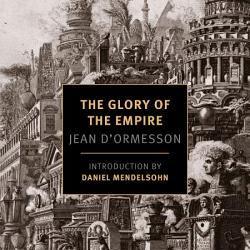
I found this, frankly, leafing through my bookshelf looking for a final book to read this year. I have a chunk of my bookshelf devoted to history books from university I never did more than skim through the introduction of, and at a glance at the cover and name I’d always assumed it was one of those. As it is actually a work of rather literary alternate history written by a French guy in 1971 I have literally no idea how I ever came into possession of it. However it happened this is, sadly one of those cases where it’s a book that’s almost written specifically for me, and is instead just a few degrees off and entirely intolerable.
The book is a history, though one of an empire that never existed. It arose and spread across the world in a vague era I can only really describe as ‘Xena Warrior Princess times’, shaping the history and cultures of everything that has followed. The book is written in the style of one of the more self-assured and grandiloquent monographs of the era, full to bursting with references to the historiography and the cultural memory of the events being described, and symbolic and psychoanaltyical perspectives on the people involved. The the book charts the vaguely Hellenistic, vaguely Byzantine empire’s rise, fall, and greater rise still across the centuries, mainly through the biographies of its three great unifiers.
Deciding what I think of this has been difficult because, as an artistic project it is a complete sense. As a matter of form it mimics (and exaggerates) the histories its based on near perfectly, and its themes are clearly are woven through the entirety of the text. Great care has clearly been taken with everything from the fake bibliography to all the ‘preserved fragments’ of poetry and the quotes put in famous figures mouths.
Perfectly executed it is just, awkwardly, a project I find somewhere between gratingly unenjoyable and actively loathsome. As a novella, it would have been a really interesting experiment in form – at 450 it’s a painful struggle. It does at least make for an interesting reading experience, if not one I can exactly recommend.
The best way that I can sum up the book is all the most irritating and tiresome tropes of old antiquarian histories, exulting in liberation from any obligation to those tedious and limiting facts and existing traditions which might restrain them. The result feels less like any sequence of events which might possibly have occurred and more like the lore of a rather generic fantasy setting.
In terms of style, the narrator drones. He bombards you into one lengthy and enumerated list of no consequence after another. He goes on long digressions about the fun anecdote leading to the discovery of a source that were presumably entertaining to him. He gestures towards the significant contributions of other schools of history as a polite aside and then ignores them entirely. He just, generally, reads like someone getting paid by the word.
As for tropes – look, this was published in the early ‘70s, a certain level of casual racism is kind of just the price of admission. But this really was just distractingly Orientalist. The constant presence of the savage barbarian hordes filling the Eurasian steppe, knowing nothing but war and bloodshed and always on the verge of overwhelming and destroying civilization, is presented as a simple and enduring fact of history. The essential and unified nature of ‘Eastern mysticism’ plays a key part in the plot. In this history stretching across all of Eurasia, Africa south of Egypt and Carthage simply does not exist except as a source of slaves. And so on – I suppose I really shouldn’t be surprised by this, any more than the occasional mentions of (male, of course) homosexuality exclusively as a symptom of decadent and effeminate urban decline, or the fact that there are (barely, and being generous) a grand total of two women with any significant at all beyond being a romantic prospect or mother of someone who really mattered.
In structure and thesis it is the greatest of Great Man histories, full of the world being shaped and remade by the epoch-defining virtues and faults of a small handful of epoch-defining emperors, ministers and saints who sweep away all before them. Logistics simply do not exist, political organization and grand strategies are organized across a span of continents without issue, every conflict is preordained by which side the Great Man of the moment happens to be on. Whole chapters of the book are devoted to giving the personal biography of the Emperor Alexius before his rise to power – chapters which feel less like reading the biography of person who might actually have existed and more like aan overlong Wikipedia article summarizing the exploits of the hero in some decades-old serial franchise. His adventures are all-but-explicitly compared to the Alexandrian Romance as a genre, but without any of the cultural context or comparisons over time that make that inspiration actually interesting.
All to say that yes, it is an excellent reproduction of a particular style of old history – and I am wholly agnostic on whether everything I just complained about is a flaw of the author or a testament to the skill of their imitation. It’s just not a kind I’ve ever found anything but tedious to read, and without the redeeming virtue of having any sort of reality to peer at through the fantasy, or a fantasy that was particularly compelling to read about on its own merits. Or I suppose some readers may find all the attributions of famous sayings, events and fables to the book’s characters intriguing or charming? Given the density and blatantness of them I just quickly found it eye-roll inducing. And without that colour the history has less drama or tension to it than the lore of your average Dungeons and Dragons setting. And as personal drama and character work – well, remarkably few plots are improved by being told in the form of a meandering essay that spends more time hammering you in the head with what glorious, world-historical love stories they are than actually telling you the story.
The books themes are quite explicit and all but didactic – about the relationship between history and fiction, and how every historian is creating their own reality and imposing their narrative on a loose scaffolding on fact and memory. Which is an entirely fair theme for a work of fiction, and I assume not quite so tired a one back in 1971. But my god are both popular and academic histories these days better about it. I have in the past joked about how ‘well isn’t that kind of reductive/oversimplifying’ has been every historian of the last two generation’s default response to any sort of theorizing or edifice-building of any kind, but this book has done an excellent job reminding me how preferable it is to the sweeping, mytheopic alternative.
Anyway yeah, intellectually interesting enough that it might have been
#book review#the glory of the empire#Jean d’Ormesson#literatre#french lit#20th century#in translation
14 notes
·
View notes
Text
Palace of Westminster & Westminster Abbey

In the bustling heart of London, where history meets modernity, lies a UNESCO World Heritage Site that defines the city’s skyline and its spirit: the Palace of Westminster, Westminster Abbey, and St. Margaret’s Church. Together, these architectural marvels embody the political, religious, and cultural history of the United Kingdom and stand as a testament to over a thousand years of British heritage.
In 1987, UNESCO recognized the Palace of Westminster, Westminster Abbey, and St. Margaret’s Church as a World Heritage Site for their outstanding universal value. They symbolize the interplay of political and religious power, architectural innovation, and cultural significance.
Perched on the northern bank of the River Thames, the Palace of Westminster has served as the seat of the UK Parliament since the 13th century. Its current Gothic Revival architecture, designed by Charles Barry and adorned with intricate details by Augustus Pugin, rose from the ashes of a devastating fire in 1834.
The iconic Big Ben (officially known as the Elizabeth Tower) is a symbol of democracy recognized worldwide. Its resonant chimes echo through the city, a constant reminder of the enduring legacy of British governance.
Just steps away from the Palace, Westminster Abbey is a masterpiece of Gothic architecture and a cornerstone of British religious and royal traditions. Founded in 960 AD, it has witnessed countless historic moments, from the coronation of monarchs to royal weddings and funerals.

Stepping inside feels like entering a time capsule. The Poets’ Corner pays homage to literary greats like Shakespeare and Dickens, while the elaborate tombs of kings, queens, and statesmen narrate centuries of history. The soaring vaulted ceilings and intricate stained-glass windows are a feast for the eyes, making it one of the most awe-inspiring churches in the world.
Often overshadowed by its grand neighbors, St. Margaret’s Church is a quaint and charming piece of the UNESCO site. Built in the 12th century, it served as the parish church for the House of Commons and remains a serene place of worship.
The site reflects pivotal moments in British history, from the signing of the Magna Carta to the development of parliamentary democracy, making it not just a landmark of London but of global importance.
The Palace of Westminster and Westminster Abbey aren’t just historic landmarks; they are living symbols of the UK’s identity. Whether you’re a history buff, an architecture lover, or simply a traveler eager to immerse yourself in the essence of London, this UNESCO site offers a journey through time that will stay with you forever. 🏛️ ✨ 🇬🇧
13 notes
·
View notes
Text
📚November 2024 Book Review📚
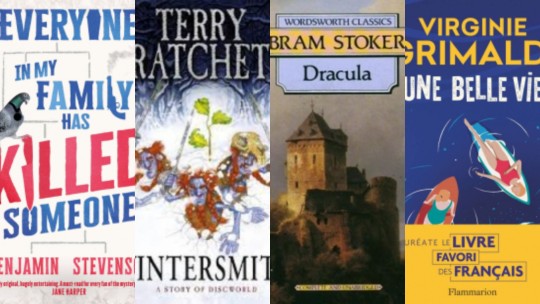
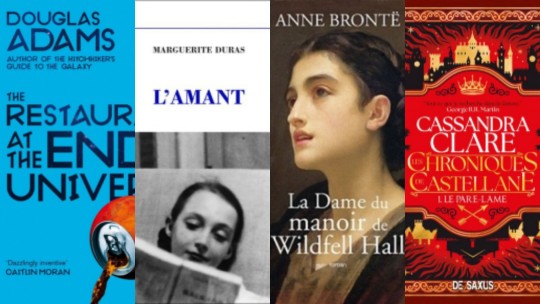
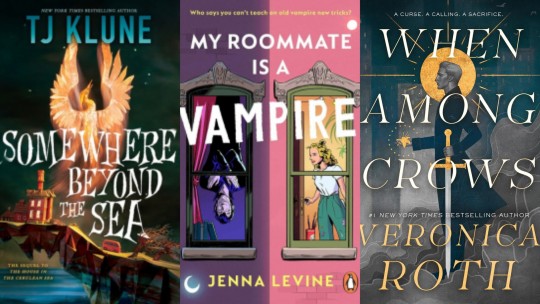
November was a bit less busy that October and varies from jawdropping to very meh.
Everyone In My Family Has Killed Someone (Ernest Cunningham #1) by Benjamin Stevenson
That one is definitely in the jawdropping category. A great murder mystery in which you have all the keys and the author is right there telling you to "go ahead and solve it". I didn't. I had fun anyway. Just as darkly funny as the title announces.
Wintersmith (Discworld #34) by Terry Pratchett
I think sofar it is my favorite Tifanny Aching story: she is growing up and that shows, she is more responsible, she owns up to what she does wrong, she is still whip smart and I never get tired of the Nac Mac Feegle.
Dracula by Bram Stoker
This count as a novel read since I completed Dracula Daily like everyone on nov 8. The audio drama version by Bloody FM production is so good and a great plus because some of Van Helsing lecture at John are really just too long.
Une belle vie by Virginie Grimaldi
I don't know why but I ended up reading 3 Grimaldi in as many months, maybe because they are rather easy to read, funny and generally have a hopeful vives even when dealing with heavy themes. This one is the story of two estranged sister who reconnect by coming for one last vacation in their grand mother house before they sell it. They rebuilt their relationship and draw back childhood memories, some good and some bad. The part where I got confused is that the author tries to tackle a lot of subjects (bipolarity, depression, domestic violence and cancer are the ones I remember but there are many) instead of just one are two. It was a lot to handle at times but a good read nonetheless.
The Restaurang at the End of the Universe (Hitchhiker's Guide to the Galaxy #2) by Douglas Adams
Book 2 is just as crazy as The Hitchhiker's Guide to the Galaxy, but I found it a little more coherent, as in I knew approximately where we were going (a restaurant) and the convoluted adventure that leads to and from it made more sense to me than in book 1. I'm really excited for the rest of the series.
L'amant by Marguerite Duras
I admit, I don't see the appeal. The writing is good but not incredibly so. The story itself is rambling, I guess it was intentional but it makes it harder to follow. The relationship between the author as a girl and her lover at least 10 years older is very disturbing when judge by modern standards and I was a little put off by the casual way she talks about her brother's death. I must have missed the literary qualities here but I might try another of her novel later on.
La Dame du manoir de Wildfell Hall (The Tenant of Wildfell Hall) by Anne Brontë
I felt so much fucking rage reading this novel! It has some of the most heinous male characters I have ever read and even the main love interest has a hell of a journey to stop being an entitled jealous violent piece of shit. That said it is very well written otherwise I would have either given up or thrown the whole thing through the window. Helen, the main character is strong minded and brave, I loved her from the start and grew even warmer. I strongly recommend it.
Tw for domestic abuse and alcoholism.
The Sword Catcher (Chronicles of Castelane #1) by Cassandra Clare
This was an indulgence: I said I wanted to read less traditional medieval heroic fantasy and it falls right into it. It is good tho! I liked the concept of the Sword Catcher and the Ragpicker King amd especially how the two characters interact. I really hope the relationship between Connor and Kel is explored more too in the future books because the homoerotic subtext deserve to be more text than that!
Somewhere Beyond the Sea (Cerulean #2) T J Klune
I loved The House in the Cerulean Sea so I was excited for the sequel, but a little weary too. I was afraid not to find what made book 1 so dear to me. But there it was! The kids and their shenanigans, Arthur and Linus being their lovey dovey selves, Zoey and Helen are all the village had kept its newly opened mind from the end of book 1 and that was very comforting. The story is hard, the hate and fear they face hits a little too close. But they overcome it and everything ends well which is just what I wanted to read.
The kids calling Arthur and Linus Dad and Papa was extremely cute. I really loved David and how he bonded with Lucy. Not a comfort book as much as the first one but I had a great time reading it
My Roommate is a Vampire by Jenna Levine
I stumbled upon this one because I watched this video of a person who read all the Rylo fanfic turned novels out of morbid curiosity and this one seemed intriguing enough for me to try, open mind and all that. I was promised some whimsy, a shopping montage and a heist.
Well there's comedy (an kumquats for some reason) The shopping montage wasn't much of a montage, they just went and tried t-shirts on. But the end was just stupid: female lead went ahead with a plan she deems stupid and unlikely to work, us reader with even the tiniest bit of social media experience know that the plan is stupid and can't possibly work. And it works. Just genuinely first degree work. When you go with that in a comedy setting at least make your stupid plan work in a funny way, WWDITS style! Some bits are tedious, I understand your 400 year old don't know how to use Instagram but I do and I don't need a full chapter of tutorial (same chapter as my newest fight with my nemesis, the possessiveness trope, you don't get to storm off and brood just cause she posted bikini pics dude!)
Overall it was quite fun if you don't think to much about it.
When Among Crows by Veronica Roth
I listen to the audio book and the accents were *chef kiss*: it is a novella with slavic folklore creatures in an modern setting and I wasn't expecting to love it so much!! It's a story about monsters and family and duty. Angsty, a bit gay, the characters relationship work very well. It will be a reread in the future.Greatest of news for me today! I discovered by googling the spelling of characters names that a second book is coming this year!
#everyone in my family has killed someone#benjamin stevenson#wintersmith#terry pratchett#discworld#dracula#bram stoker#une belle vie#virginie grimaldi#the restaurant at the end of the universe#the hitchhiker's guide to the galaxy#douglas adams#l'amant#marguerite duras#the tenant of wildfell hall#anne brontë#the sword catcher#cassandra clare#somewhere beyond the sea#t j klune#my roommate is a vampire#jenna levine#when among crows#veronica roth
9 notes
·
View notes
Text
Not to make light of a tragedy, but in light of AO3 being down, I'm putting forth my free ebook to fill the void. It contains loads of angst, found family, superhero domesticity, and lots of queerness.
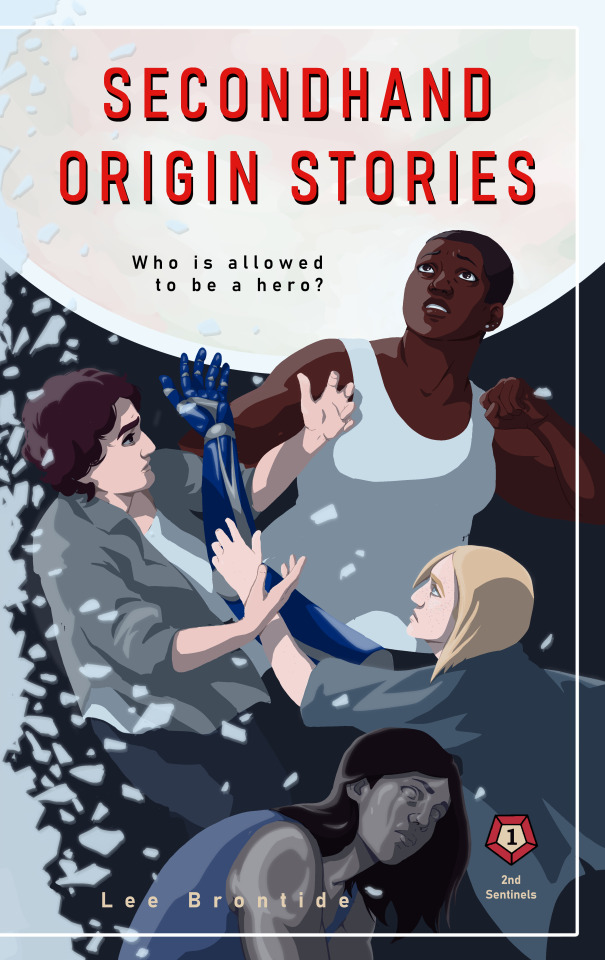
Also, the next installment (book 2 in the series) is guaranteed, because it's been written, so you won't be left hanging.
You can get it, right now, for free, right here.
I invite any other self-pub authors who can list their books for free and who come from that grand fanfic literary tradition to RB with their own offering for the grief-stricken masses.
84 notes
·
View notes
Text
Great Sage Emperor
Those who have read Journey to the West (1592) will remember that it is Tang Emperor Taizong (唐太宗) who sends Tripitaka on the quest to India. Well, I was interested to learn that the monarch's historical posthumous title includes "Great Sage" (Dasheng, 大聖):
Wenhuang 文皇 (The August Cultured [Emperor]) ... is the original posthumous title given to Li Shimin following his death in 649. The title was expanded to "Wenwu Sheng Huangdi" 文武聖皇帝 (The Cultured Military Sagacious August Emperor) in 674 and was later again changed to "Wenwu Dasheng Daguangxiao Huangdi" 文武大聖大廣孝皇帝 (The Cultured Military Grand Sagacious Grand Extensive Filial August Emperor) in 754 (Jiu Tang shu, 3.62-63) (Nienhauser, 2010, p. 202 n. 34).
My own clunky translation for the latter is the "Great, Universally Filial Emperor and Great Sage of Civil and Military Affairs." [1]
His title is interesting because, as I've mentioned elsewhere, Taizong bestows Sun Wukong's literary precursor, the "Monkey Pilgrim" (Hou xingzhe, 猴行者), with the name “Great Sage Steel Muscles and Iron Bones” (Gangjin Tiegu Dasheng, 鋼筋鐵骨大聖) at the end of the 13th-century JTTW (Wivell, 1994, p. 1207).
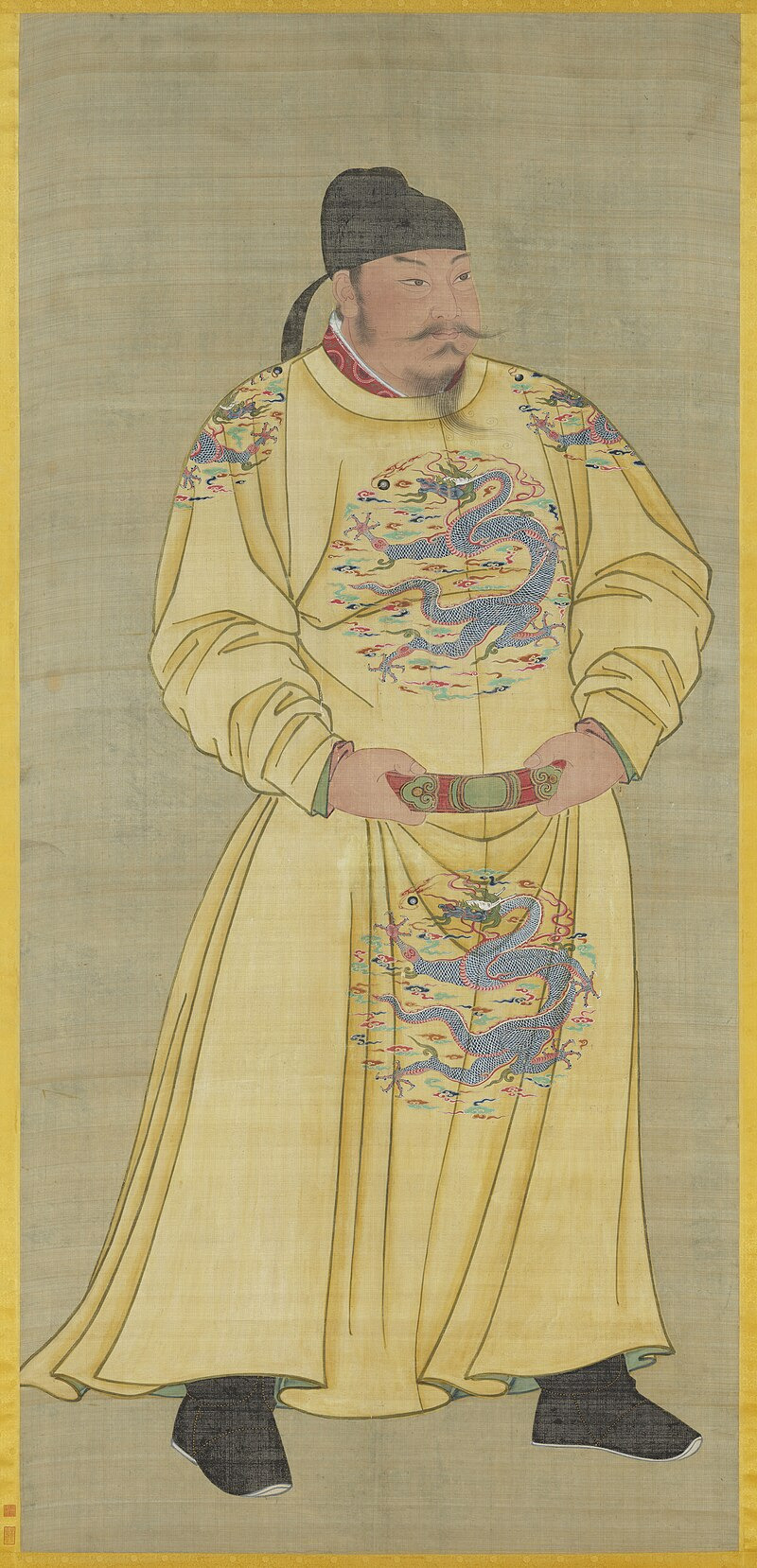
Note:
1. The guangxiao (廣孝) of Wenwu Dasheng Daguangxiao Huangdi (文武大聖大廣孝皇帝) means to be filial to everyone, so I went with "Universally Filial."
Sources:
Nienhauser, W. H. (2010). Tang Dynasty Tales: A Guided Reader. Japan: World Scientific.
Wivell, C.S. (1994). The Story of How the Monk Tripitaka of the Great Country of T’ang Brought Back the Sūtras. In V. Mair (Ed.), The Columbia Anthology of Traditional Chinese Literature (pp. 1181-1207). New York: Columbia University Press.
#sun wukong#monkey king#journey to the west#jttw#Tang Taizong#Chinese emperor#Great Sage#lego monkie kid#LMK#Tang dynasty
48 notes
·
View notes